#you could give me lore on the level of like... the guest list for any divine family dinner party at any point in the last three millennia
Text
youtube
This is a really interesting panel with the developers at Summerfall studios, giving some cool insight into how the process of making the game worked! it helped me put some words to the thing I maybe loved the most about Stray Gods -- the way that every single character in it feels very deeply loved, in all their messiness and struggles and stuckness, all the way from the writing to the art to the music. They're very different but all feel like they were somebody's favourite character, and it's nice to hear that that seems to be because it's basically true lol
Austin Wintory also has some great videos on his channel breaking down the nitty gritty of how on earth you make an interactive musical that works, as well as looking deeper at different songs and explaining things like why there're four official versions of the soundtrack (!)
#stray gods#summerfall studios#Youtube#resources#david gaider has perfected the art of creating characters and stories that burrow into my brain specifically forever#and I can only thank and curse him for it#I'm super looking forward to what this studio does next there's clearly SO much amazing talent here across the board!#I wonder if they'd do a sequel. my brain says they probably shouldn't but my heart says GIVE IT TO ME RIGHT THE FUCK NOW!!!#you could give me lore on the level of like... the guest list for any divine family dinner party at any point in the last three millennia#and I would eat it up ravenously. I'm laughably easy. I just want more of these characters haha#stray gods may be one of those games best served by being a standalone unique thing...... but im not gonna lie I CRAVE more of it haha#every single little unaccounted for detail I come across I am going full always sunny conspiracy board meme at the figurative camera
7 notes
·
View notes
Text
Lmao remember that COF College AU
Finally decided majors and details for some of the characters I plan to include XD
My first time using a cut lol
Tristan
Business Major
Cassian absolutely wants him to inherit the family business
Tris isn’t so thrilled by that
Sev and him are roommates
Neither of them can cook anything other than ramen or pizza rolls
Sometimes they order pizza
Disaster bi on so many levels
Went to one GSA club meeting but then noped right back into the closet
Not out to Cassian or most of his friends yet
The only person who knows is Sev
Has a brown tabby cat named Rex
duh
lmao going back through there’s like nothing here
they def got longer as they went on
Nyk
Linguistics, Interpretation, and Translation Major
(In HOF she is really interested in the Pyrean language and lore so I thought it fit)
Was homeless for a while
Ran away as soon as she graduated high school
(She couldn’t be around Val any longer)
Applied for a lot of scholarships and was able to gather enough money to attend college
Roommates with Sparrow
Helps Sparrow get to her classes sometimes
Elliot, Riella, and Kade come over to their dorm a lot
Elliot cooks for them
Probs gonna be bi and genderfluid in this au
Has a calico cat named Xephyra
Phyrie for short
Is a part of the GSA club
The GSA club consists of Anders, Elliot, Sparrow, and Kade
Sev
Fine Arts Major
Is really good at drawing but also likes painting and sculpting, too
Roommates with Tristan
Would rather die than ask Tris to get something off of a high shelf for him
He’s 5′3″ (160.02 cm)
Def petite
Tris put a whiteboard on the fridge to write shopping lists on but now they both just use it to write notes to each other
“Saw u staring at Nyk earlier HMMMMMM”
“stfu like you weren’t ogling that dude she was with”
Disaster gay but everyone just assumes he’s straight like ????
After his parents died he bounced around a few foster homes but was adopted by a doctor named Hestia when he was fifteen
He loves his mama and visits her on weekends
The food he brings back to the dorm is the only good stuff he and Tris ever eat
Knows Kade but only a little
All of my modern Sev hcs still apply
Kade
Veterinary Medicine Major
Shares the same major as Sparrow and they’re decent friends
He helps Sparrow get to the classes they share when Nyk can’t
Loves animals and is planning to adopt a doggie soon
Roommates with Elliot and Riella
He lived in a really crappy place before he became friends with Riella
The sibs invited him to move in with them (Kade also obviously helps with rent)
Became good friends with Nyk and he and the sibs spend a lot of time at her/his dorm
Used to shadow Hestia at the clinic (before he decided he wanted to be a vet and not a people doctor) and she gushed all the time about her son
He met Sev and def thinks Sev is adorable
Has also seen Sev around campus but hasn’t worked up the courage to talk to him yet
Demi and gay
Is a part of the GSA club
Thinks Anders is funny
Almost no one agrees
Elliot
Culinary Arts Major
Idk it just came to me and I was like “might as well”
Cooks for Riella, Kade, Nyk, and Sparrow regularly
Has a golden retriever named Jax
Jax is crazy
He gets the zoomies
Jax is usually wary of strangers but he’s warmed up to Riella, Kade, Nyk, and is close with Sparrow
Aroace
Attends GSA
Regularly tells Anders where he can shove his musical numbers and snide comments
Roommates with Riella and Kade
Took online classes until Riella graduated so they could move together
Met Kade through Riella
Can’t handle spicy food and is appalled by the fact that Kade, Riella, and Sparrow are all fueled by eating the spiciest things possible
Refuses to eat anything with pepper on it, but keeps a shaker for his friends and sister
Nyk and him bond over being unable to tolerate anything hotter than a hot tamale candy
Likes driving
Owns a minivan
It’s unclear as to why he needs a minivan he just has one
He named it Elliot jr. as a joke once but now no one lets him forget it
Is super ultimate BFFs with Sparrow
Helps her around campus when Nyk and Kade can’t
Sparrow
Veterinary Medicine Major
Nyk, Kade, and Elliot help her around campus (still blind and thriving)
Owns a parrot named Chirp and guide dog that everyone is 95% sure is just a wolf that Sparrow illegally bought a service animal vest for
No one knows the name of the dog
Sparrow claims that Chirp can talk but only does it in front of her
Sometimes Elliot will also claim that he’s heard Chirp talk but no one can tell if he’s telling the truth or not (He’s not even sure at this point)
Lesbian ace and is highkey dating Riella
Elliot pretends it annoys him but secretly he’s thrilled because he adores the both of them (he’d never reveal this but Sparrow knows anyway)
Attends GSA
Brings her animals
Chirp usually just sits on her shoulder, and the dog at her feet
Has super unruly hair
Only a select few are permitted to touch it: Elliot, Riella, and Nyk
Nyk will braid it sometimes, but Sparrow usually likes to have it free
Roommates with Nyk
Nyk decorated their room super cute, fairylights strung all around it and polaroids on the walls (though I guess she can’t see them rip)
Nyk loves Sparrow’s animals, and the animals get a long great with Phyrie (except for one time that Phyrie attacked Chirp but that doesn’t happen anymore)
Riella
Dance Major
Not much is known about Riella but I just thought this’d be a cool major for her
idk she gives off ballerina vibes for some reason
Sapphic and dating Sparrow
Roommates with Elliot and Kade
All three of them share a bookshelf and love talking about books
They also play video games a lot together
Minecraft is not a competition but do not play with the three of them they will win
They share an ACNH island on the switch they pooled money for
Loves having her hair in french braids
Nyk usually braids it for her before classes
Ig Nyk just braids everyone’s hair smh
Wears rompers everywhere
Met Kade when a creepy dude approached her on her way to a class and Kade pretended to know her to get her away from the creepy dude
He started walking her to that class just in case and they became friends
Anders
Performing Arts Major
Super dramatic and way into theater
Has been out of the closet for years as genderqueer and pan (Prefers he/him pronouns; he’s used them all his life and he’s used to them)
Goes to GSA club and loves telling obnoxious stories
Has hinted at being in a relationship but no one knows who it is, and the club tries to find out sometimes (It’s Latham)
Grew up with Latham and they started dating when they were seventeen
Latham isn’t out of the closet yet, so he asked Anders to keep it a secret
Anders doesn’t mind at all, he’s just happy to be with the boy he loves :)
Was a part of marching band in high school, and still practices his trumpet in his free time
Regularly texts everyone a gross amount of emojis
Latham and him moved in together when they graduated and started going to college
Latham does all the cooking
The last time Anders attempted to cook anything, the pan caught on fire (the cooking pan not Anders) (XDDD) (I think I’m hilarious)
He’s not allowed to cook anymore
They each have their own beds but usually sleep in the same one when they don’t have guests (they are both huge cuddlers) (Anders is the little spoon)
Has a pet snake because he lives to be extra (It’s a ball python)
(I can’t remember what Anders’ phoenix is named so the snake is nameless for now)
Latham
Pre-Law Studies Major
Wants to become a lawyer
Absolutely talks crap about everyone he knows with Anders
Identifies as queer but is closeted
His family are all very religious and anti-LGBTQ+ so he’s scared to come out to them
The only person who knows is Anders
His father in particular scares him
His dad really doesn’t approve of Latham being ‘friends’ with Anders, ever since Anders came out publicly
Is decent at cooking (nowhere near as good as Elliot)
Doesn’t have a lot of friends
Kind of knows Tristan and Elliot but not really
Has a Pomeranian named Xane
He’s obsessed w/ little dogs
20 notes
·
View notes
Text
Yugioh Ep 32 S4: Most Disturbing Kid’s Show Award Goes to This Episode
I often talk about how wonderfully effed up Yugioh is. What a freakin delight, how effed up this kid’s show is, somehow still remaining a Y7 kid’s show, despite everything it tries to do to get pulled off the air.
Y’all this was a filler season and it didn’t even have Bakura in it so...why did it go so edge? Don’t get me wrong, I’m thankful for how many levels of “OK THERE, KID’S SHOW” it was.
But what the hell was that, Yugioh?
Anyway we start off completely normal in this foggy ass graveyard--Halloweens in this season so I’m down for this. Halloween is also...cancelled...this year, so at least I can celebrate it somewhat in a Yugioh episode. Then again, can you imagine how many people would be dressed up as sexy Covid?
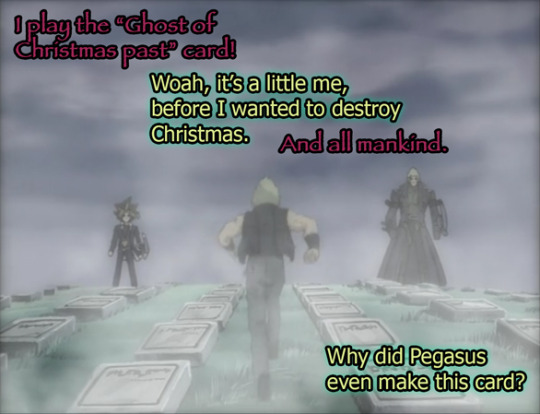
So I don’t really talk about the card game mechanics on here, and (full disclosure to any new people) I don’t know how to play this game. But, considering that this card doesn’t usually send you to distant graveyard memories IRL, lets get into it.
We’ve clarified before that Card Graveyard is a place--like an actual place--but that it isn’t the same place that the cards vibe in within the Puzzle necklace. It’s a separate place, but ALSO not the same place as the Shadow Realm, either. Card Graveyard is just...some other third place we never talk about.
TBQH I think the people who make this show have kinda forgotten how many random pocket dimensions we’ve made that are basically the equivalent of hell (including California, PS), and are just like “no one will write a blog about it and list them all in one place, we’ll be fine.”
We’ve only seen Tristan bum out here once in like S1 and he spent most of his time running away from the Grim Reaper. But, if you remember correctly, the Grim Reaper is currently hanging out and living his best life haunting some park in Japan, so now instead of the Grim Reaper it has...this?
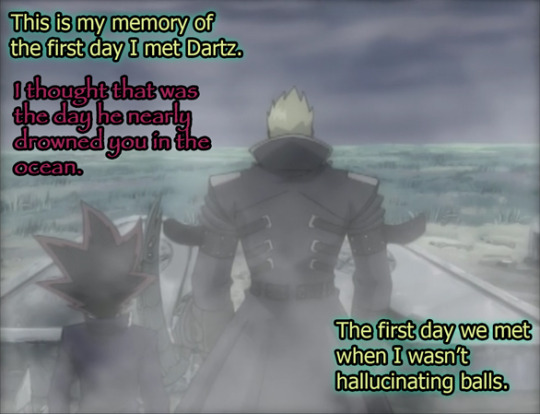
So is this a memory stored within the card graveyard, or did Dartz literally take Raphael to the card graveyard and tell him this was a real ass graveyard?
We’ll never know! It gets very vague from here on out!
(read more under the cut)
First off, I’d like to welcome our new guest star--the Rain--there’s a lot of rain in this episode, and we animate it by just making all of our characters glow. This comes through fine in animation, but in caps I just want you to know that no one has gone super Saiyan, they’re just...wet.
PS get a gander at Raphael’s baby boy mutton chop mustache. They somehow got longer with time? And also, when soaked his hair is just as spiky. Everyone on this show has unparalleled hair gel. The real heart of the cards.
Anyway, Dartz shows Raphael a bunch of gravestones and is like “Get it???”
and me, the audience, was like “no???”
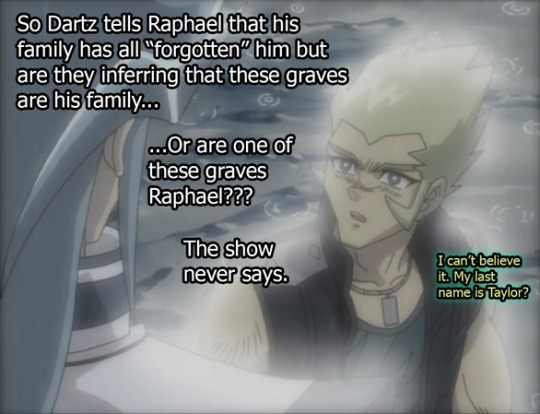
The headstones, by the by, aren’t...normal, either, they have Orichalcos symbols on them instead of words. So like...it sort of infers that his family was taken by Orichalcos, too. I mentioned before that it sorta feels like Dartz caused the whole shipwreck to munch up a bunch of yummy souls, and maybe he did in the Japanese version--cuz like...
...why else do all these headstones have Orichalcos symbols on this graveyard that you can only access through a card god like Dartz or Yami?
Just throwing that deep lore out there, and the fact that Raphael can’t really see it or understand is either because that didn’t happen or...Dartz totally killed his family, right? And that makes this relationship between the two of them extremely effed up?
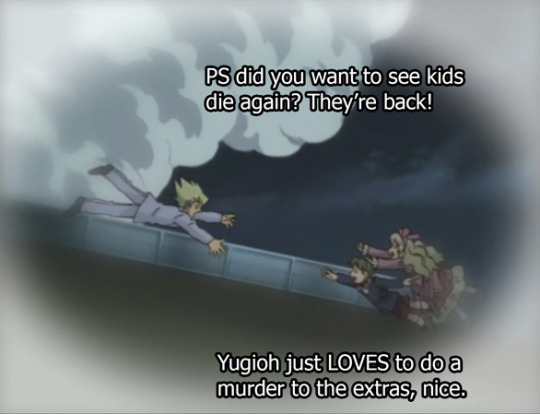
This is a great show for kids with separation anxiety.
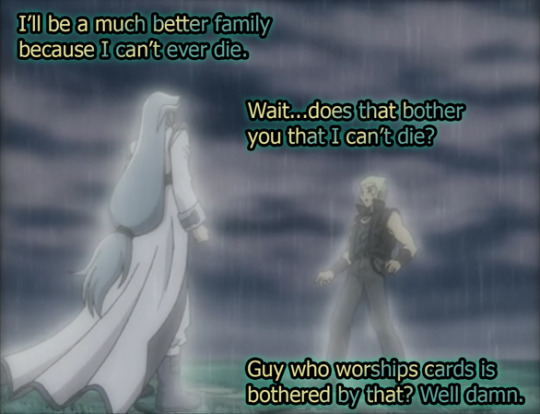
Which is...somewhat convincing of a motive for Raphael. He gives Raphael a way to move on from his trauma in the past, and it’s not a GREAT way to move on--but it’s falls in line with things Dartz has done with his other card generals by offering false redemption.
Like Mai needed to move on from her insane jealousy, so Orichalcos was her way to prove she was better than Joey Wheeler (which, honestly, no one needed proof of). Alister needed to move on from his dead brother, so Orichalcos was his way to get revenge. Valon also had a backstory but a bunch of it got deleted in the English version apparently so...
And Rex and Weevil needed...cards? I guess? I think they just needed a ride, mostly. And Orichalcos can give you a ride. It’s not like we had Uber in 2003 and clearly they were not fit for Caltrain.
And like Gurimo.............existed...?
Anyways, they’re looking for justice that they can see. Justice for their pain. To make that pain worth something for more than just suffering. A system where this type of thing can’t happen anymore. But the thing about justice is that...eh...it’s probably not done through cards that kill people.
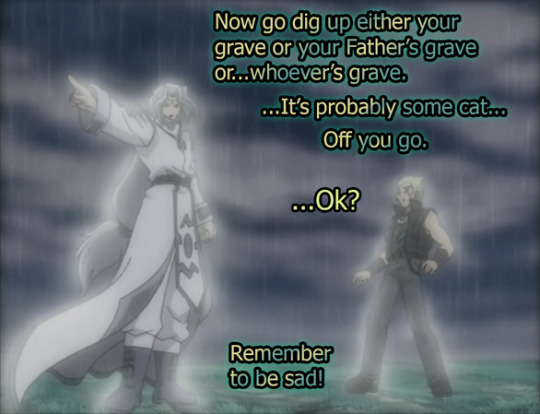
OH OK, KID’S SHOW.
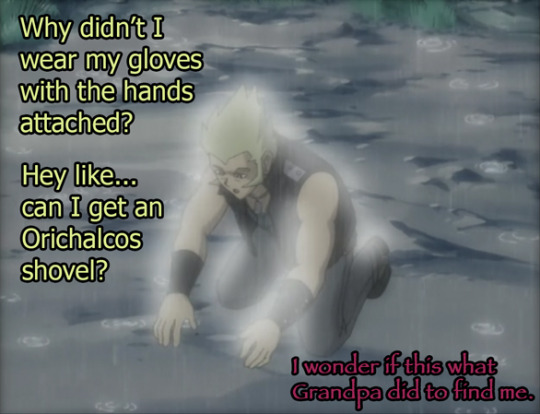
Mmmmm take in that burying up your grave imagery. Again, this show is rated Y7 for 7 year olds, and I think that’s amazing.
Anyway, this is symbolism that is so heavy handed that it really needs no explanation, so he’s just gonna dig dig dig for...days I guess? Relive his trauma over and over again? Dig up that past like you’re a popular artist on twitter and you gotta make all of your followers relive that time you got called out because you offended a hell ton of people?
(Which is so many people on art twitter right now, ps, you don’t even know which one I’m talking about because It’s SO MANY of them. Art twitter during Quarantine is like watching the fall of Rome but it’s freakin Art Twitter. Everyone’s the freakin worst and just poopin all over themselves as they roll all the way down the steps.)
But I want to know. Who’s grave this is? It has a slightly different meaning if it were his family’s or his own. I guess I’ll have to save it for the fanfiction.
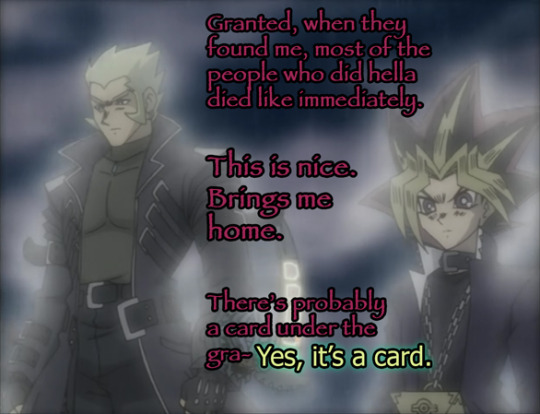
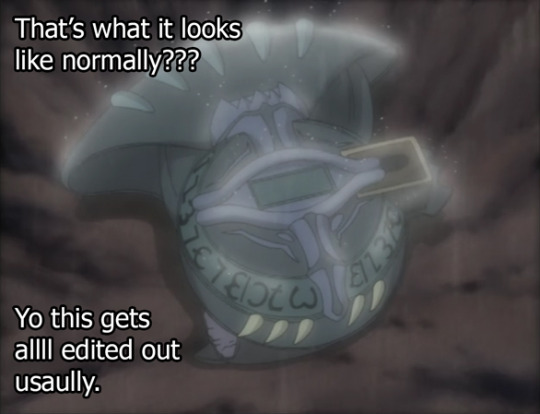
And so to add another level of spook, Raphael’s card mom shows up and kinda just stands there with a sad face?
Raphael’s reaction to seeing his card just alive and hanging out was “I’ll get to you in a sec, I gotta do some unforgivable evil, first.“
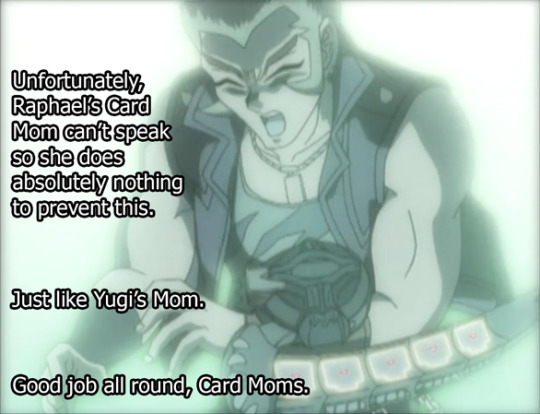
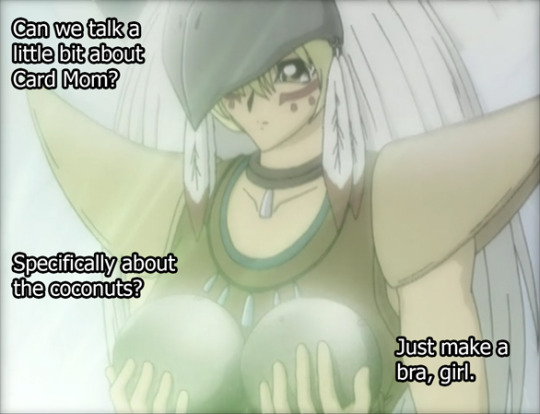
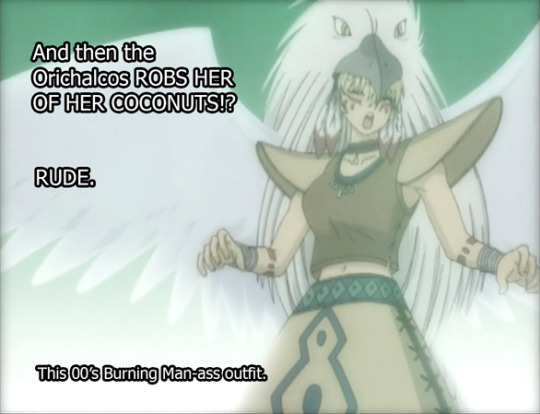
WHERE DID THEY GO?
These two shots are like nearly back to back. They’re just GONE. No explanation.
And yes I’m gonna talk about the outfit because it makes no freakin sense, even for a Yugioh card. Granted, this was a show made in Japan, for kids, with a budget that had a limit. A lot of people get involved with these productions, many aren’t artists or historians versed in American History, just basic ass business people. That be TV.
But her outfit looks waaay too modern. Like she’s gonna go to a musical festival, drop acid and climb on top of a statue and take a bunch of instagram selfies and regret all of them 4 years later. If these are Atlantean cards, this is not an Atlantis outfit to match with Dartz, who has been dressed vaguely medieval. So whyyyyy would this girl be dressed more like a vague old western costume bought at a discount so she could vogue in front of installation art at Burning Man in 2008?
Anyway, I won’t even get into the bird that is slowly devouring her face as a stand in for a headdress or wtv. Just a lot of stuff happening here and I just wanna say, Yugioh did it so you won’t need to. Just delete that desire. Yugioh already did it so you are now free from wanting to draw...anything like this problematic situation on your own OCs.
And then Yugioh predicts exactly how I’d feel about this outfit.
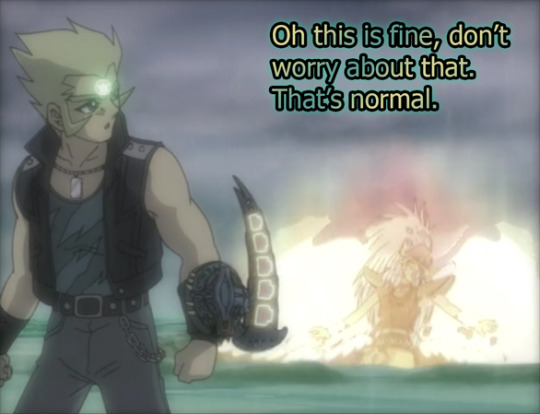
And she then lights ON FIRE and falls dead into the grave he just buried for her.
And in case you were like “kinda on the nose there, Yugioh, that got DARK” she climbs out of his own grave with a spooky ass face and no more coconuts to share with her bros and he’s like...
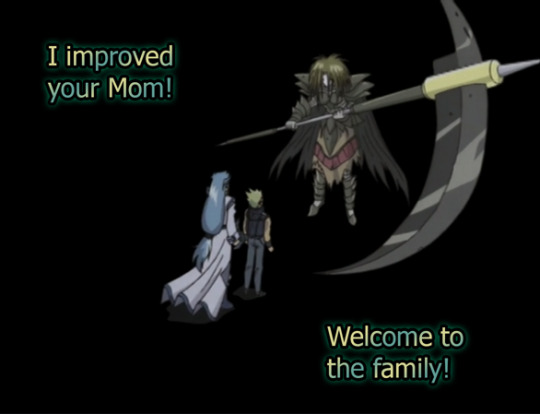
Rapheal’s reaction was like...Ya OK I can get used to this, and Yami is just pointing at the scene desperately trying to follow Raphael’s brain waves.
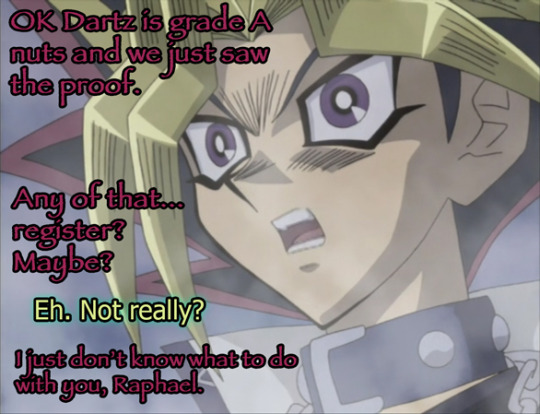
And like, this is YAMI.
Yami just walked through Yugi Hell earlier today. He’s seen some stuff. He’s already undug his own grave this morning in a more poetic card sort of way. But Raphael’s memories of literally digging up his family’s graves with his bare hands because Dartz told him to was...stuff he didn’t want to see today. (especially since it’s super suggested Dartz was the one who...murdered them in the first place, like I know it’s a reach but...it just feels like we were supposed to reach that conclusion)
But whether or not Dartz put the bodies here or gave Raphael a bunch of phoney graves, Raphael is still essentially siding with the guy who ruined the only thing he has left of his family--this paper card mom--and turned it into an undead evil Mom. And it just had...no freakin impact on Raphael at all.
Like what?
He just murdered your card mom. This is fine?
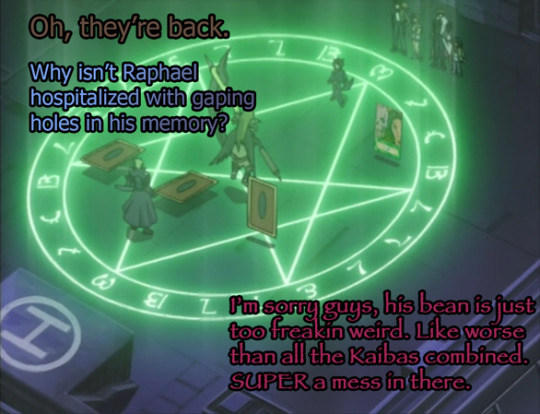
Card shenanigans continue and Raphael eventually realizes what he should have realized like 10 years ago when he was digging up graves and killing card Mom’s. That maybe it’s a bad idea. So Raphael decides to sacrifice his remaining monsters to “free” them from the graveyard and basically commits suicide. There’s no other way to say it, really. He kills himself.
But wait, right when you figure this episode will end like every other Orichalcos fight before it...They decide not to.
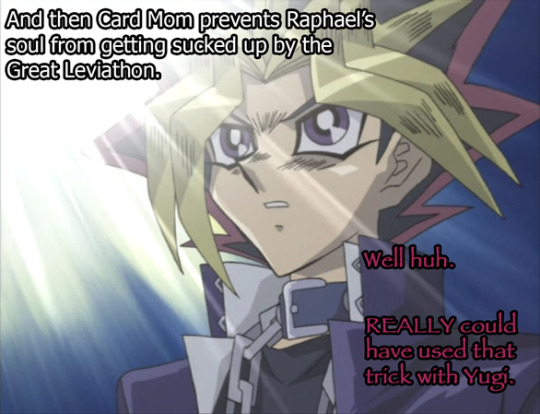
Like an angel from heaven, our drunk ass looking music concert reject descends from the clouds, along with all of Raphael's dead family members!
Yeah.
I REALLY didn’t expect them to show up. This was so much content it’s like...an entire season of any other TV show. I say that a lot with Yugioh but these episodes really like to just jam-pack it in there.
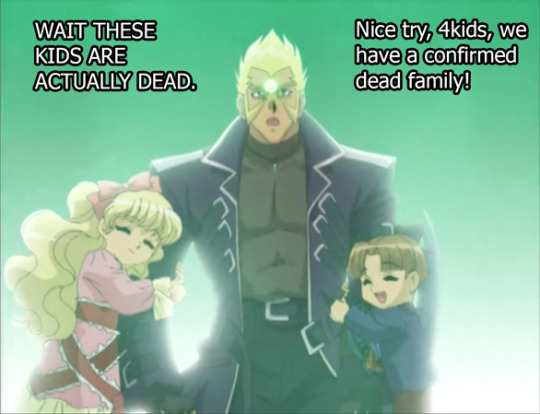
And here I thought I’d actually have to take them off the Death Count one day. Here I thought 4 kids would do something to like...prevent this many dead kids, but I was wrong.
Everyone’s HELLA DEAD.
it’s both vindicating to actually say that, despite 4kids, these kids absolutely died, but also disturbing because even Raphael is like “ah, the hallucinations today are really swell, right?”
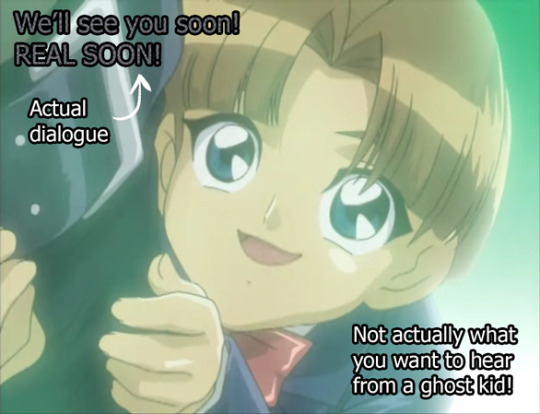
NO, GHOST CHILD.
DON’T TELL ME THAT.
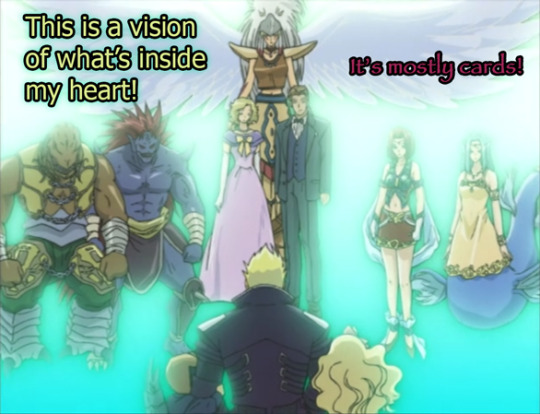
And I’ve been over before how “heart of the cards” is a catch-all phrase that can mean literally anything in this show, and it’s not the first time that cards have kept someone’s spirit around. No word on his family members if they are thrilled to be trapped in a Pharaoh situation, or whether they only occasionally drop from the heavens, or whether they have actually been the spirit that was within each of these cards the whole time. I don’t know.
And so the card family “cures” one of the most evil people on this show.
He’s fine now. This guy murdered the hell out of Yugi, our main character, but don’t think nor worry about it. This isn’t the show to worry about such things.
This show has Marik.
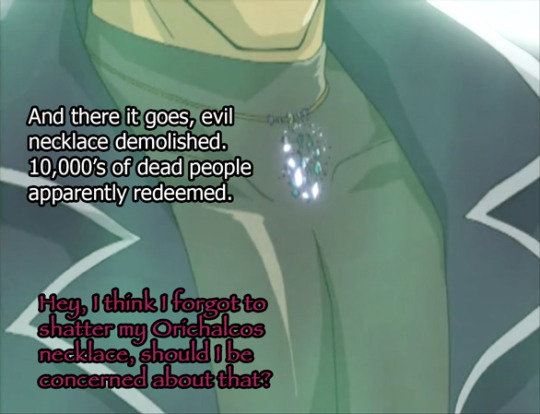
Bro and I were talking Star Wars the other day, and mostly about the Kylo Ren arc and how a lot of people happened to dislike that particular ending. Mostly about how there is a difference between your character being redeemed and being forgiven. I think this children’s show wants to redeem Raphael, but honestly, much like Kylo Ren--he’s just forgiven. And that’s fine. You don’t need to have your characters redeemed. We can stop at forgiveness.
And also, Yami forgives him immediately because he knows he can’t throw a single damn stone, his house is made out of 2 mm of extremely problematic glass.
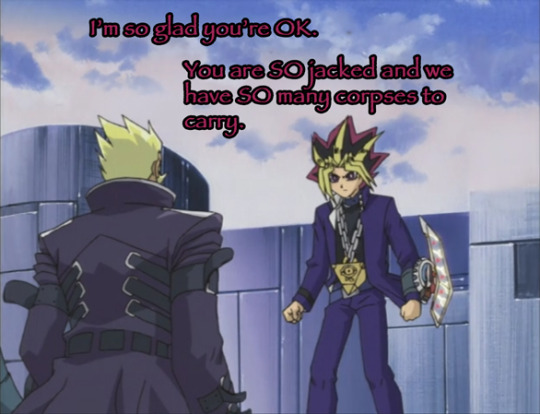
Man, RIP Weevil, right?
Weevil who just pretended to rip up a card that could have been Yugi and got tossed off the freakin Caltrain? Raphael got off so freakin lucky and I am boggled he’s still alive. He freakin killed Yugi!
The injustice to Weevil right now, omg. Not like I enjoy Weevil. I super don’t enjoy that character. But DAMN. Yami murdered Weevil for even mentioning Yugi. Just feels like there’s a bit of a hypocritical line here in how the justice is dished out and...that tracks for a Pharaoh so I’ll just let it go.
And also, looking at that sunshine and I’m pretty sure they’ve been up over 48 straight hours. No one’s slept since Yugi died, right? I mean Yami is fine. We know from Bakura that puzzle people don’t need to sleep, or eat, or have blood in their body. But like Seto really needs to get Mokuba to bed.
(Although I am 85% positive that Mokuba is still part Noah Kaiba so it is...also unlikely that kid sleeps anymore, just leaving Mokuba’s future therapist so much to unpack.)
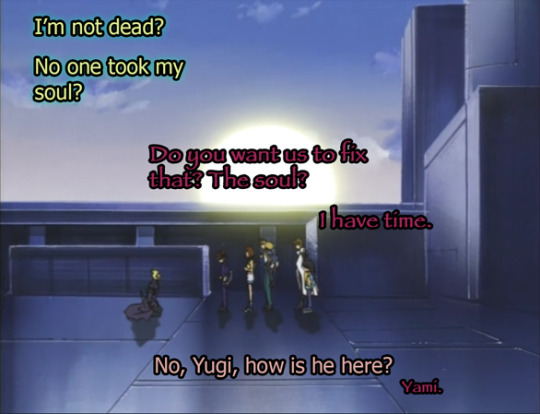
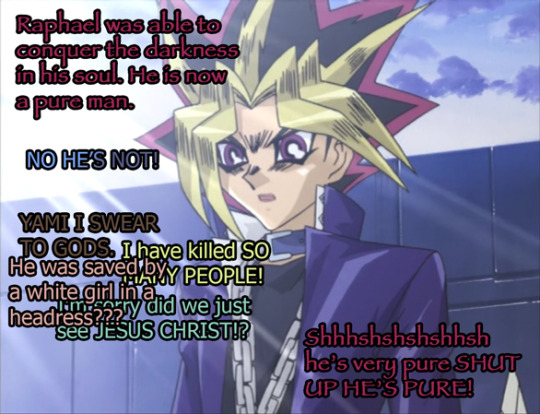
The GALL of this show right now.
Of all the generals--they saved RAPHAEL? Arguably the worst one?
I would take even Alister. I would take even Weevil.
Raphael?
I mean if he ends up as the next Duke Devlin, just driving us around for the final season of this show I guess I’ll accept this but, damn.
Raphael?
Are you sure, Yugioh???????????????????????????????????
Can’t we just let that guy die? He’s basically dead already, Yugioh. This guy does NOT want to be alive anymore. Literally everyone he cares about is super dead and now he doesn’t even have Card mom because she sacrificed herself to save his soul. This GUY.
I can’t believe Mai is dead but we still have Raphael.
The same disappointment when I watch British Bake off, man, they just...sometimes they save people and I’m like...no man...that one can’t bake. Just because they pulled something off last second does not mean they get to the semifinals. Raphael can’t bake.
Anyway, the episode attempts to end on a cliffhanger but like.
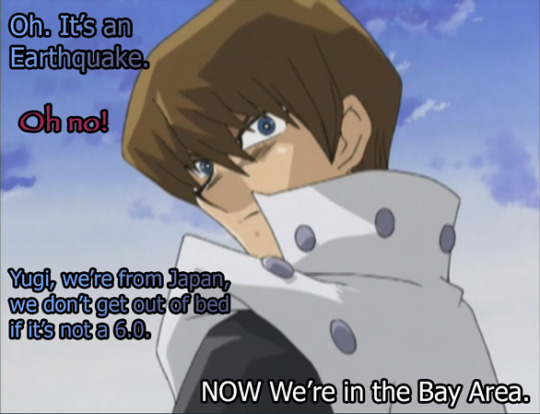
Just want to reiterate how common and boring Earthquakes usually are to a Californian. This was the most normal thing in this episode.
Man.
Freakin Raphael.
Anyway, if you just got here and is like “I don’t know who the hell Raphael even is,” Yeah, I know, I didn’t think twice about the dude until like just now, but if it’s because you’ve never seen my recaps before, I’ll direct you to the link to read these in Chrono order:
https://steve0discusses.tumblr.com/tagged/yugioh/chrono
Anyway, stay safe and have a very happy and safe Halloween alone eating your own carmel dipped apple slices.
#yugioh#ygo#recap#photo recap#yami muto#seto kaiba#raphael#weird redemption arc#tristan taylor#tea gardner#mokuba kaiba#joey wheeler#'s still a corpse#someone digs up their own grave at some point#it gets very dark for a character I have literally no interest in#and then like they're cured? freakin#this one was like for the Raphael fans in the house#shout out to you guys I know you must exist or else why is this episode even here?
32 notes
·
View notes
Text
1x11: Scarecrow
Welcome to our harvest themed hiatus episode. Hope everyone enjoyed their freakin’ pie this week!
Burkitsville, Indiana
Sixteen Years One Year Ago
A young couple leave a friendly town after the townsfolk load them up with pie and gas for the car. “Everyone in this town is so nice,” remarks the wraith young woman. The man adds, “Yeah, what’s the catch?” The townsfolk’s daughter niece notes that the dude has a cool arm tattoo.
Once on the road, the couple’s car dies. I love how the woman asks what happened and the dude is just ¯\_(ツ)_/¯ . They head into an orchard looking for help. They come across a scarecrow.
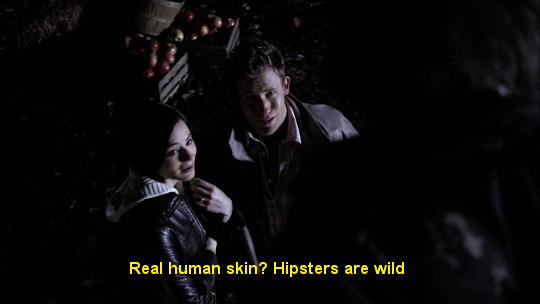
The woman is a bit freaked out, and I would be too if I saw the damn thing move! They hear strange noises and start running. The camera work gets grainy so you know we’re in scarytime land. The couple gets separated. The woman runs alone until she finds the man again -faceless and dead on the ground. She screams and then the now loose and animate scarecrow is upon her!
*John Winchester is a Horrible Father Alert*
Sam wakes to a ringing cell phone. He answers it and it’s John. He’s all evasive and apologetic about disappearing. He’s on the trail of the thing that killed their mom. It’s a demon! They have to stop chasing him. It’s not safe. Sam refuses. He wants answers. John jumps into drill sergeant father mode and Sam continues to balk.
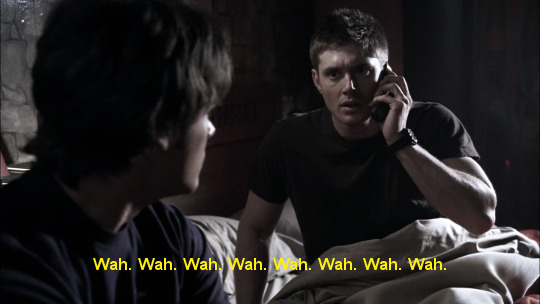
Dean grabs his phone, AND MY GOD, watching Jensen transform silently while Dean listens to John talk is magnificent. He just falls right into order, writes down the names of three missing couples, and the brothers hit the road.
*Sam is driving Alert*
Ok, hold the phone, Dean’s giving backstory to the missing couples. They’ve gone missing every year in the second week of April. I --what? I should probably watch the whole episode before recapping, and I haven’t seen this episode in years and don’t really remember the secret. There were apples all over the orchard implying it’s the fall...hmm. Dean’s amazed at the level of research John did to figure out something was happening. He calls him “a master” and I just die a little knowing how very little John knows.
Sam stops the car and tells Dean that they’re not going to Indiana; they’re going to California.
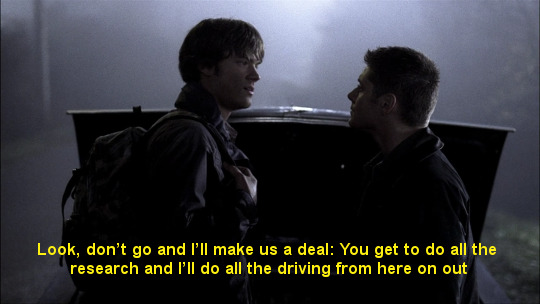
John is on the trail of what killed Mary and Jess, and Sam wants to be there for it. Dean insists that John gave them an order (I’m having serious John/Chuck and Soldier Dean/Free Will feelings right now, give me a moment). Whew, Sam pulls the ‘My girlfriend just died six months ago’ card and insists that Dean can’t know how important this is to him. Dean continues to be a good little soldier though. Sam gets out of the car and tells Dean that he’s going to California. See ya! Dean tries pulling what I can only imagine the same move John pulled many times over the years, and tells Sam that he’ll leave him on the side of the road. That’s what Sam wants! Dean leaves.
Oof, there’s a lot to unpack with that fight. I’ll just throw up @mittensmorgul post. I’m just so very happy to see how far Dean’s come.
Dean pulls into the town in Indiana. He meets Scotty, owner of the local cafe. He introduces himself as John Bonham. “Isn’t that the drummer for Led Zeppelin?” How this hasn’t happened more over the years is beyond me.
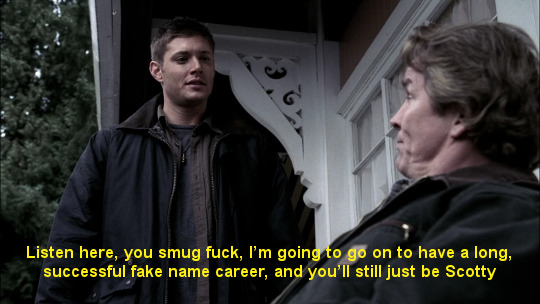
Dean asks about the missing people and Scotty dismisses him quickly. They don’t get a lot of strangers around the town. Dean tries flirting with the guy but the man is a stone wall.
*Meg Alert*
Sam, meanwhile, continues to walk down the road hoping to see a passing car. He finds a young woman just sitting and listening to music instead. Like, wtf is Meg doing? Sam, how is this not suspicious activity to you? Anyway, a truck pulls up and offers to take only the lady.
Dean asks at the general store about his “friends”. Emily, the young woman there, remembers them. Dean heads off to where the couple was last seen driving. Dean’s driving along and his EMF starts to go nuts. He’s right by the orchard and walks in to investigate. How is this April? Anyway, Dean finds the scarecrow and we’re gifted with the now iconic line: “Dude, you fugly.”
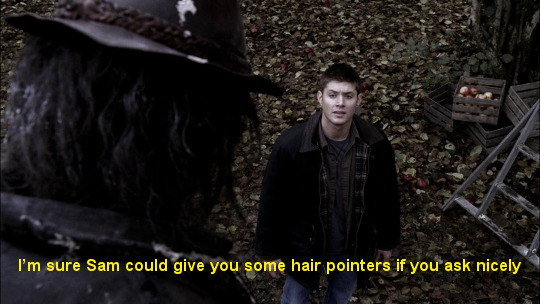
He takes a closer look at the scarecrow and sees the tattoo on the arm. SMART, OBSERVANT BOY.
Dean heads back to town. He stops to get gas and talk to Emily. (Sidenote: Can all guest stars wear a necklace with their names on it so I’m not scrambling to figure out names every week? Thx.) Emily tells Dean how she came to the town when she was 13. It’s the middle of nowhere, but she loves it. This town seems blessed compared to the surrounding towns. Dean’s not suspicious at all. Dean asks about the scarecrow. Emily admits that it’s always just been there. Detective Dean also finds out a couple is in town waiting on their car to get repaired.
Sam is dealing with the nightmare that is the American Car Culture and lack of decent mass transit across our expansive 50 states. He runs into Meg again. This time she introduces herself.
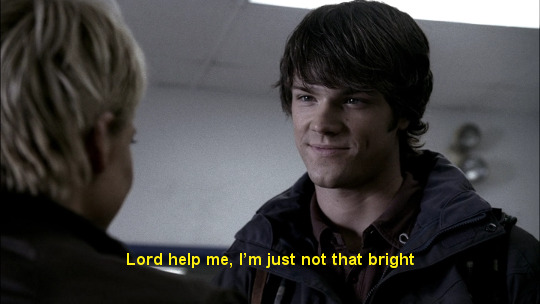
Dean heads to Scotty’s to find the couple (and eat pie.) Boy does he need to work on his casual chit chat. Scotty is suspicious AF at Dean and tells him to leave them alone. Dean doesn’t and even offers to fix their car for them so they can hit the road sooner. They decline his offer, and like, I get it, but HOW DARE they accuse Dean of not being a mechanic.
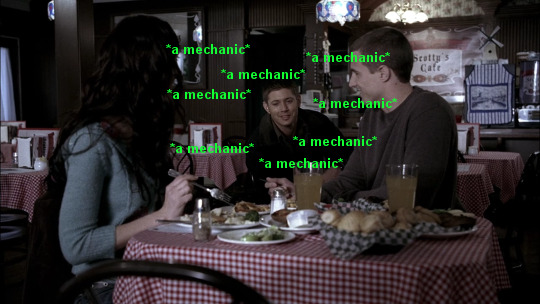
Dean tries to warn them again but just comes off as creepy and they brush him off. Dean laments the lack of Sam’s puppy dog face, and then Scotty calls the local law enforcement on him. They literally chase him out of town. Lol.
Meg and Sam bond over a romantic bag of Cheetos and some beer. She’s on the run from family expectations too! Looks like they’re made for each other, friends. (This is the nicest damn bus station I’ve ever seen. It has NAPKIN holders! And tables! And beer!)
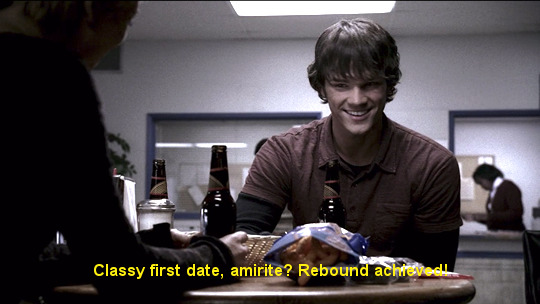
While Sam’s enjoying a meet-cute, the couple from the restaurant clutch each other in the apple orchard, the scarecrow in hot pursuit, when Dean appears. He shouts at them to run back to their car and shoots fruitless holes in the scarecrow. The moment they all arrive back on the road, the scarecrow disappears.
On his phone, Sam gets the hunt recap from Dean while he watches his new friend sleep at the station. Dean figures that he’s dealing with a god because the killing happens once a year, it’s always couples, and “you should see the locals. The way they treated this couple. Fattenin’ ‘em up like a Christmas turkey.” It’s ritual sacrifice, baby. While Dean’s talking, he’s driving out to a local community college to meet with a professor there and get some information about what kind of god he might be fighting. He tells Sam that he’s proud of him for defying their father and going his own way in life. Dean wishes he could do the same. To quote Boris, excuse me while I fling myself into a volcano.
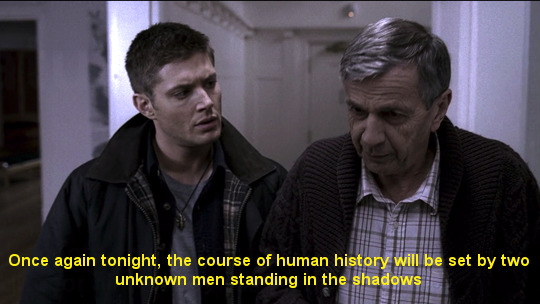
Dean chats with the Cigarette Smoking Man a professor in the nicest damn community college I have ever seen. He asks about pagan lore and the origin of the residents of Burkitsville. They were Scandinavian which leads to Dean’s next pointed question: he’s looking for a Scandinavian god who might live in an apple orchard. They pull down an ancient book of lore - the kind that is standard issue in every community college classroom - and start paging through looking for a “woods” god.
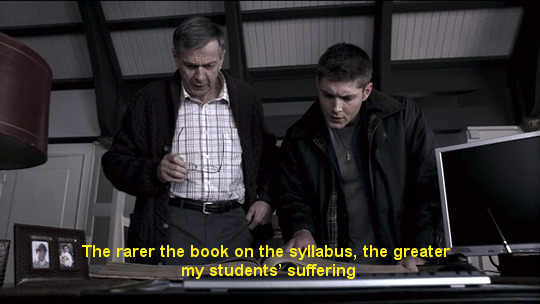
Dean spots a creepy scarecrow drawing. The description lists the scarecrow as a Vanir, a norse god of protection and prosperity which keeps villages from harm. Worshippers built effigies of the Vanir in their fields, and some practiced human sacrifice. They’re tied to a sacred tree. Dean, my best and direct friend, asks, “So what would happen if the sacred tree was torched? You think it’d kill the god?” LOL, there’s no such thing as gods, young man! Dean bids farewell to the professor and immediately gets conked out by the Burkitsville sheriff. SIGNIFICANT LOOKS™ are exchanged between the professor and sheriff.
Later, rain falls heavily on a group of older folks standing outside under umbrellas. Three of them plead with Harley, the gas station owner. His wife tells him that the trees are beginning to die. It’s the “seventh night of the cycle” and they have one more chance to appease “it.” Dun dun DUN.
For Pretty Shot Science

Cut to a cellar door opening. The cadre of elderly conspirators hauls a tearful Emily down to be trapped alongside Dean. Her aunt comfortingly tells her that it’s for “the common good.” (This REALLY makes me want to rewatch Hot Fuzz again!)
At the bus station, Sam and Meg’s bus finally arrives. But Sam’s got a problem. His brother hasn’t answered his phone for the last three hours. He’s got to go to Burkitsville! “You’re running back to your brother? The guy you ran away from?” Meg implores Sam to go to California with her, but Sam tells her he can’t. His family needs him.
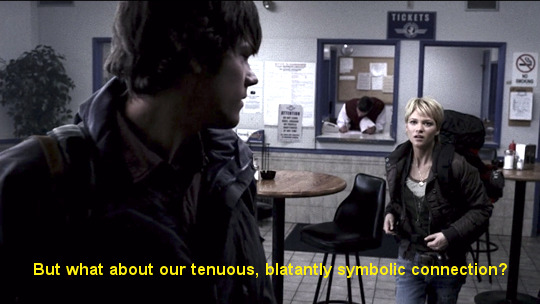
In the cellar, Emily freaks out about her newfound knowledge of a murderous scarecrow god and her accomplice relatives. Dean describes human sacrifice as “classier” than plain murder and…Dean Bean. More helpfully, he tries to put together a game plan with Emily. He asks her about an old tree - one the locals might treat with respect. Emily does know about a tree that the locals call “the First Tree.” Subtle naming, dear locals!

They’re seized from the cellar and tied in the orchard as evening approaches. Emily pleads for her life, but her aunt tells her that family bonds aren’t enough to save her. “That’s what sacrifice means. Giving up something you love for the greater good.” (I’ll just...look directly into the camera.)

Much later, night’s fallen and Dean is still working on a plan to free them both. Something insidious approaches and….wait, it’s Sam! Dean’s practically giddy to see his brother, who stole a car to get to town in time. What a good, thieving bean! Dean tells Sam to keep an eye on the scarecrow because it “could come alive any minute.”
In classic horror movie fashion, Sam asks, “What scarecrow?”

The scarecrow’s on the loose, but our trio is finally free in the orchard. They’re prevented from escaping by the four town elders penning them in with shotguns, however. Harley tries to convince Emily to give up (and die) when the scarecrow’s sickle slices through him, killing him. It drags Stacy and Harley away, having claimed its yearly couple at last.
The next morning Sam, Dean, and Emily walk through the orchard with a can of fuel. They find the “First Tree” which has runes carved into its bark. Sam douses it with gasoline and Emily lights the tree on fire. Look at this wholesome tale of youth dismantling a toxic system!
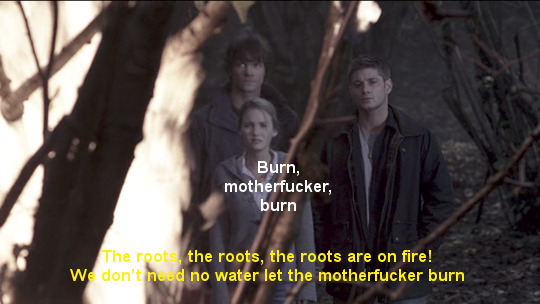
Back at the station I finally get a good look at the bus company. It’s called “American Freedom Coach Lines.” LOL, if you need me I’ll be picking myself up from the floor after being hit by this symbolic brick.
Emily boards a bus headed towards Boston. Dean gleefully anticipates the murder-town’s slow, god-less demise before asking Sam about his plans. “I still wanna find Dad. And you’re still a pain in the ass. But, Jess and Mom…they’re both gone. Dad is god knows where. You and me. We’re all that’s left. So, if we’re gonna see this through, we’re gonna do it together.” Can I get a yee-haw?!

Meanwhile, Meg’s hitched a ride with Creepy Driver Number 2 and suggests “pulling over” when he asks her where she wants to go. He pulls a little way off the road and she takes out a silver bowl. “I’ve gotta make a call,” she tells him before slicing his throat open and filling the bowl with blood. She stirs it, mutters an incantation, and then asks the bowl why she wasn’t allowed to just kill Sam and Dean. Someone clearly gives her orders and she says, rather ominously, “Yes, Father.”
Natasha: This is one of my favorite episodes! What’s not to love about creepy scarecrows and murderous fertility/prosperity rituals?
____________________________
I Hope These Quotes Were Frickin’ Worth It:
I’ve given you an order
I don’t understand the blind faith you have in the man
Dude, you fugly
Nice tat
My brother could give you this puppy dog look and you’d buy right into it
Indiana isn’t really known for its Pagan worship
I hope your apple pie is freakin’ worth it!
Hold me, Sam. That was beautiful.
____________________________
Want to read more? Check out our Recap Archive!
48 notes
·
View notes
Text
Heirs and Cast-Offs
The birth of a sibling isn't always the happiest affair--especially not for Arahael, uncertain of her place among her people. A talk with her grandmother makes for... interesting conversation.
Written for the April 18th general prompt Customs and Traditions. It looks like writing about one of the Chieftains of the Dúnedain I head-canon as a woman has become an annual tradition (Probably to be combined with writing about one of the rulers of Arthedain I head-canon as a woman).
[Also on AO3]
[CN/TW: Brief discussion of rape; internalized misogyny. A more general note is that, as ever, the views of the characters do not necessarily represent my views.]
-----------------------------------
Her mother had been brought back to Imladris almost as soon as it was discovered that she was pregnant. Lady Ídhil had had a hard time of it with Arahael, from beginning to end, and Lord Aranarth thought it better that she be monitored by the Elven healers for as long as possible. Arahael had seen little of her mother since the latter was brought to Imladris, though that was scarcely unusual—her mother was typically far away in the northern wastes of what had once been Arnor, and had neither the time nor the opportunity to visit the place where her daughter was fostered. As a younger child, Arahael had resented it, but Master Elrond had taught her (among the other things he had taught her) the paramount importance of adhering to duty. Her parents could not be with her, but they still wished for her to be safe and cared for, and have all the advantages she would have had if her father was King of Arthedain instead of chieftain of a scattered, broken people. That was why she was here, and they were so rarely with her. And even if they were rarely with her, it was hardly as though they’d left her alone.
She’d seen little of her mother. Lady Ídhil’s health had been poor since around the third month of her pregnancy, and she rarely stirred from the rooms that had been prepared for her. Arahael’s days were consumed by her lessons—dawn to dusk, she had lessons. If she neglected them for even one day, it would take well-nigh a week to catch up. She’d done that but once while her mother was here, stealing away from her lessons to pay her mother a visit.
“Do you think it pleases me to see you disrespect our allies thus?” Her voice was deathly quiet as she spoke, her eyes like chips of ice. “Leave me. Go back to them, and beg forgiveness. If you wish to please me, you will dutifully attend your lessons, and never again visit me when you should be elsewhere.”
The rebuke had stung, but it was supposed to; a rebuke could not be taken to heart unless it pierced the flesh. Arahael had done as her mother had asked, and on the occasions they saw each other, she thought Lady Ídhil was happier with her. But they hadn’t seen each other often.
It was months ago now, nearly a year ago, that Arahael’s mother had come to Imladris. Her father was here now, as well. She had seen little of him. Given what was happening, she wasn’t certain she wanted to. Her mother had given birth, Arahael’s sibling had been brought into the world, and everything that had happened since then left Arahael less and less certain of just what her place was supposed to be.
“You’ve been very quiet.”
As ever, when her grandmother spoke up suddenly, it was jarring, despite all the reasons it shouldn’t have been. Her grandmother had lived in Imladris for longer than Arahael herself had been alive. She ought to have felt like a fixture here, her presence as right and natural as the towering peaks of the Hithaeglir that surrounded the town, as ineffaceable as the voice of the Bruinen. And yet, she seemed as Arahael sometimes still felt—at best, a guest; at worst, an intruder. Someone who was allowed to live here, but would never truly belong here.
Lady Arwen had murmured to her, her night-dark eyes trained on a point just over the top of Arahael’s head, that all Men were guests on this earth. One of the names the Elves had given to Men when they first met was the Guests, for they had perceived that this world was not their true home. Arahael had never forgotten that conversation. The memory of unease sat on her chest in the dark of the night like the tales she had heard whispered by Éothéod traders passing through Imladris on their way west—the mære, an evil spirit that tormented sleepers by sitting heavily upon their chests, tearing at their flesh with their claws and flooding their minds with terrible dreams. She felt… unsettled.
Now, more so than ever.
“Have I?” Arahael asked, her voice more stilted than it normally was to her ears. Fíriel had taught her grandchild Sindarin as the people of Gondor spoke it, and they had taken to speaking to one another in that dialect when they were alone. It had never sat as well on Arahael’s tongue as had the Sindarin of the northern Dúnedain, the Sindarin of the Elves of Imladris, but she made the effort for her grandmother’s sake. After everything else, it did not seem so much to ask, that Fíriel of Gondor could hear Sindarin spoken as her countrymen spoke it.
“Indeed, you have,” Fíriel told her, her keen eyes glinting with the edge of her amusement. “Until you spoke I was wondering if you hadn’t been struck mute.” Her voice softened as she pressed her hand to Arahael’s arm. “What troubles you, child?”
Arahael twisted the tip of her belt in her hands, trying to find words with which to make concrete the things that were twisting in her mind—mære fears, or perhaps the fears manufactured by a worrying child, or perhaps they were reasonable fears considering what had happened. She felt her grandmother’s touch on her mind. Gentle, no doubt meant to be reassuring—it didn’t feel like she was trying to pick the locks on the doors or force them open, not the way her father might do if she behaved thusly with him. “You’ve seen my mother,” she said slowly, tentatively. “You’ve seen the baby.”
“Indeed I have, Arahael. It’s been more than a month.” She tilted her head downwards, so that they were a little closer to being on eye level with one another. “I could scarcely have avoided it,” she added conspiratorially, her mouth twisting in a rueful smile.”
“Then… you know. That the baby’s a boy.”
Fíriel’s eyebrows shot up. “I have been told as much, yes.” She regarded Arahael with her head tilted slightly to one side. “This is something that troubles you?”
Arahael bit her lip. Her grandmother was a daughter of Gondor, many generations removed from Númenor, but she had never seen in any way diminished to Arahael’s eyes. She was well past her hundredth year, and her face was as smooth as an Elf’s, her hair untouched by frost. Her eyes were as far-seeing as any king of old’s must have been, her mind as quick and wise. Though Arahael could immediately discern the difference between Fíriel and the Elves, her grandmother still seemed to Arahael grand and ageless, as timeless as the Hithaeglir. She could imagine Fíriel must have been what Silmariën looked like when she ruled Andúnië, thousands of years ago. The blood of Númenor ran stronger in her than it did in anyone else Fíriel had ever seen, and the things that plagued Arahael’s mind seemed… small, in comparison.
It was too late to give her excuses and bow out of her grandmother’s chambers, too late to pretend that she was not troubled at all. Much as she would have liked to go, Arahael saw now avenue that would let her. She sucked in a deep breath—meant to be steadying, but honestly, she didn’t feel any different at all. “The baby’s a boy.” Her fingernails sank into her knees, needle-points of pain even through layers of soft, rich fabric. “I don’t know what’s going to happen to me now.”
“Why should anything happen to you?”
A knot formed in Arahael’s throat. “Everyone says men are better warriors.” And still believed it, even when Arahael spent hours slaving over exercises, over archery and swordplay and knife-work. She learned quickly, her teachers allowed, but her natural skill would never be the equal of a man’s. That was something that everyone knew, a truth so obvious that usually there was no value in saying it aloud.
“Being a leader means more than just being able to swing a sword and strike true, Arahael,” Fíriel pointed out. “There were many kings in Númenor—ruling queens, as well—who never brandished a sword against a foe.” She picked up a book from a nearby dresser. “I could list them to you, if you so desire.”
“I’m not going to be the heir anymore.”
“That’s not how it has ever been done in Arthedain, child—the oldest child inherits, regardless of their sex. The disagreement between Amlaith and her brothers is the reason it was Arthedain, and not Arnor.”
Arahael stared up at her. “They wouldn’t let you been Queen of Gondor,” she said in a small voice, “because you’re a woman.”
Fíriel’s expression was unreadable—she could be made from carven stone. “And you believe that because your father has the blood of Gondor in his veins, he will follow Gondor’s customs and disinherit you.”
Silence. There was nothing she could say, nothing that didn’t sound utterly pathetic.
Everyone agreed that men made for better warriors than did women. Fair enough, the Chieftain of the Dúnedain’s duties were not limited to combat—Arahael had just as many lessons about healing, woodcraft, and herb lore as she did the art of war. But it was scarcely possible to deny that the North was a dangerous place, any more than it was possible to deny that the Dúnedain were always at risk, and that they needed a leader who was as great a warrior as a healer.
Most also believed that men made for better leaders than did women, and Arahael couldn’t work around that by giving her all both to lessons in combat and in healing. Men were made to lead, women to follow. Though everyone had always insisted that she was an exception, that the highest blood of Númenor was not governed by such things, this was still what they claimed to be true. Only a man could be both the warrior and judge his people needed.
Now, Arahael was no longer her father’s only child. The Chieftain of the Dúnedain had a son, a son who could be the warrior, judge, and leader the Dúnedain needed, scattered across the North as they were. Arahael had always striven to be all that her people needed her to be, but would it be enough or him? Or would she be set aside in favor of the baby? Was it her fate to be doomed to become one of the unnamed spaces on the old genealogical tables, unworthy of a name for she was a woman who had neither ruled over anyone, nor married anyone who did?
No intrusion upon her mind was forthcoming, not even the gentlest of knocks upon the door, but Fíriel sensed her disquiet, all the same. She reached out and grasped Arahael’s hand (it was shaking, she realized almost absently, and even more absent was the revelation that she couldn’t remember when her hands had started shaking thus) in her own large, strong hand, giving it a gentle squeeze. Her hands were always so warm, Arahael thought numbly, even in the depths of winter when the snowdrifts were up to her waist. “The North isn’t as Gondor in matters of inheritance, my love.” She smiled slightly, her eyes tilting upwards. “You need not fear the theft of your inheritance.”
“But what if Father—“
“Your father will not forsake Arthedain’s laws in such a manner,” Fíriel said firmly. “He’s too much a traditionalist; no doubt he thinks that to rob you of your rights would bring the wrath of the Valar down on his head.” She looked off to one of the walls of her chambers. “He’s far too devout to risk that.”
“But they wouldn’t let you be queen at all,” Arahael mumbled. Her mouth twisted in something akin to a grimace, the thought swirling in her head a distinctly unpleasant one. “And Grandfather…”
The wind blew through the open window between them, as if to prove some kind of point. “The throne of Gondor was never my birthright to begin with. It’s hardly surprising that they wouldn’t let me have it. Although—“ A shadow dark and obscuring as a funeral shroud passed over Fíriel’s face, and for a moment, she seemed as old as a woman of lesser blood would have seemed at her age. The shadow passed, but it left behind a spark of bitterness that gleamed out of Fíriel’s eyes like pale fire. “And your grandfather, oh, what illustrious company he wished to keep.
“Herucalmo the Upstart, who leeched off of a weak-willed queen and stole his only child’s birthright for his own. Calion the Tyrant, who won a crown for his lofty brow by nobly raping his cousin—“ Fíriel’s lip curled; Arahael winced “—and spent it driving Númenor headlong into the abyss. I wonder what they would have called my husband, had he succeeded? Arvedui the Insolent, perhaps?” She tapped a finger against her mouth. “Or perhaps Arvedui the Unlearned? Certainly, if the claim he made to the Council was not totally disingenuous, it showed a shocking lack of understanding of the Númenórean inheritance laws he was trying to invoke.”
In spite of herself, Arahael blinked, startled by the venom dripping from her grandmother’s voice. Knowing what she did, it should have been obvious that there would be something like this lurking in Fíriel’s mind, waiting for the opportunity to be vented. But she had never evinced as much to Arahael, and it had never occurred to Arahael to look for it. Fíriel of Gondor had lost much. Fíriel of Gondor had been denied much. More than Arahael had, and more than Arahael thought she ever would, even if she was stripped of her inheritance as her half-mære fears warned she might be.
“What did you think of it?”
The question was blurted out, with Arahael not realizing until it was put to the air that it might not have been the best thing to ask. But it was in the air, said and done; it was too late to take it back.
Fíriel raised an eyebrow. “Of my claim being rejected?” she asked, entirely too calmly—Arahael caught sight of her shoulders stiffening. “Or your grandfather trying to take my claim for his own?”
Arahael watched her face closely, wishing her grandmother’s mind was not a house full of locked doors and shuttered windows. “All of it,” she said finally, her voice hushed.
Not immediately did Fíriel reply. She leaned back in her chair, drawing a deep, sharp breath, nostrils flaring and eyes narrowing. “I never,” she said quietly, “while my father and my brothers still lived, I never thought that I could be the queen of Gondor. We have already discussed the differences between Gondor and Arthedain in this—let me go a step further. In the waning days of Númenor, the eldest daughters were stripped of their rights; Tar-Míriel was not the only one. Elendil and Anárion hated the men who did this, but they were happy to follow the precedent they set. There have been no Ruling Queens of Gondor. Women cannot inherit the throne, even if all of their brothers are dead, and their brothers childless. Not even a king’s sister-son can inherit the throne from him. The thought of my being acclaimed queen was ridiculous.
“My father never pretended that I would be anything but what I was.” Her voice was very soft; she slowly twisted the ring on her left hand from side to side. “I would never been a great woman. I would marry a great man. I would bear his children. Perhaps one of the children I bore him would be a great man, and if he was, I would be remembered as his mother. That was what I would be. No matter what my abilities—“ she clenched her jaw “—that was what I would be. I was always loved, but my family let me suffer under no illusions of what I was permitted to be.”
Her eyes misted over suddenly; she clapped a hand to her mouth. Arahael leaned forward, alarmed, but Fíriel waved her off with her free hand. “It was the most ridiculous idea. But then I learned that my father and my brothers were all dead.” She wavered, a few shaky breaths escaping her mouth, distorted by the hand still planted over her mouth. “Gondor was in turmoil; there was no clear line of succession.” As soon as Fíriel’s eyes had misted over, they hardened, water freezing to ice. “He tried to use me to make himself king of a land he had never before cared for,” she hissed venomously. “If it was anyone’s claim, it was mine, not his.” She took her hand away from her face to reveal that her mouth was twisted in an almost grotesquely hideous scowl. “If either of us should have ruled Gondor after my father died, it should have been me.”
Arahael stared, feeling all of a sudden something like an intruder, and very much like a stranger.
Fíriel drew another breath, and closed her eyes. When she opened them, she was familiar to Arahael again, her wise, kindly grandmother. “I was a Silmariën,” she told her gently. “A path was closed to me, and I found another. I did not enjoy the level of success that Silmariën did—I never ruled anything in my own name, not even my own house—but I was one of my father-in-law’s highest advisors, and he lent his ear to my counsel when he would not take heed of anyone else.
“You, Arahael…” She reached out and held both of Arahael’s hands in her own. Her grip was slacker this time, almost weak, but there was a vitality under her skin that belied it. “…If I am Silmariën, then you are Tar-Ancalimë, Tar-Telperiën. Your life shall be what you make of it. None of us are without things that limit our choices—in your case, it is your duty to your people—but you will have so much more control over your fate than I did.” A shadow of bitterness passed over her face, before it melted away. “And remember, Arahael. If you think that someone means to steal your birthright from you, you must fight to keep it, rather than simply withering in despair. Never let them have it, no matter who they are. Never let yourself be ruled by fear.”
Not trusting herself to speak, Arahael nodded.
--------------
Bruinen—‘Loud water’ (Sindarin). A river in the east of Eriador. It originated as two tributaries flowing out of the Misty Mountains, one of which came from the High Pass. The Bruinen flowed through the valley where Rivendell was located, and formed the eastern border of Arnor (later, Rhudaur).
Éothéod—a race of Northmen who lived in the north of Middle-Earth, near the Vales of Anduin and Mirkwood. They were the ancestors of the Rohirrim.
Hithaeglir—the Misty Mountains (Sindarin); the mountain range separating Eriador and Rhovanion, the largest mountain range in Middle-Earth; first raised by Morgoth to hinder Oromë in his hunting of Morgoth’s creatures
9 notes
·
View notes
Text
LINGUA IGNOTA UNVEILS NEW SINGLE, ANNOUNCES ADDITIONAL TOUR DATES
Her visceral new track “Do You Doubt Me Traitor” appears on her sophomore album, CALIGULA, out July 19 on Profound Lore. ]

"one of the most cutting edge and progressive new pieces of music in 2019" - Destroy//Exist
On her new album CALIGULA, Lingua Ignota takes Kristin Hayter’s vision to a new level of grandeur, purging her and vengeful audial vision going beyond anything preceding it and reaching a new unparalleled sonic plane. Eschewing and disavowing genre altogether, Hayter builds her own world. She fully embodies the moniker Lingua Ignota, from the German mystic Hildegard of Bingen, meaning “unknown language” — this music has no home, any precedent or comparison could only be uneasily given, and there is nothing else like it in our contemporary realm.
Listen to (and share) Lingua Ignota’s harrowing new single, “DO YOU DOUBT ME TRAITOR,” now via YouTube.
Due out July 19th, CALIGULA finds Hayter at the peak of her powers as a vocalist, composer, and storyteller. The album refuses to settle in any known lane, instead opting to tackle massive scopes and influences spanning across time and place. One thing remains unchanged, though: Hayter continues to explore themes of violence and vengeance through a survivalist narrative that is equal parts chilling and empowering.
Working closely with Seth Manchester at Machines With Magnets studio in Rhode Island, Hayter strips away much of the industrial and electronic elements of her previous work. Channeling the menacing intensity of her live performances, Hayter utilized unconventional recording techniques and live instrumentation to bring a frenetic energy to CALIGULA.
Pooling talent from Sam McKinlay (THE RITA), visceral drummer Lee Buford (The Body) and frenetic percussionist Ted Byrnes (Cackle Car, Wood & Metal), with guest vocals from Dylan Walker (Full of Hell), Mike Berdan (Uniform), and Noraa Kaplan (Visibilities), CALIGULA is a massive work, a multi-layered epic that gives voice and space to that which has been silenced and cut out.
CALIGULA will be released via Profound Lore on July 19 and Lingua Ignota will be on tour this fall in support of the album. Preorders are available here. Look for more news regarding Lingua Ignota and CALIGULAto come soon.
CALIGULA — Track Listing:
1. FAITHFUL SERVANT FRIEND OF CHRIST
2. DO YOU DOUBT ME TRAITOR
3. BUTCHER OF THE WORLD
4. MAY FAILURE BE YOUR NOOSE
5. FRAGRANT IS MY MANY FLOWER’D CROWN
6. IF THE POISON WON’T TAKE YOU MY DOGS WILL
7. DAY OF TEARS AND MOURNING
8. SORROW! SORROW! SORROW!
9. SPITE ALONE HOLDS ME ALOFT
10. FUCKING DEATHDEALER
11. I AM THE BEAST
Lingua Ignota — On Tour:
September 9 Chicago, IL @ Empty Bottle
September 10 Detroit, MI @ Deluxx Fluxx
September 11 Toronto, ON @ Baby G
September 12 Montreal, QC @ La Vitrola
September 13 Providence, RI @ The Columbus Theater w/ The Body
September 14 Hudson, NY @ Basilica Soundscape
September 15 Brooklyn, NY @ Public Records
September 17 Philadelphia, PA @ PhilMOCA
September 27 Amsterdam, NL @ de Brakke Grond *
September 28 Amsterdam, NL @ Paradiso *
October 7 Krakow, PL @ Unsound Festival
November 8 Austin, TX @ LEVITATION / Empire
November 25 Los Angeles, CA @ Zebulon
November 26 San Francisco, CA @ Bottom of the Hill
* w/ Amenra
Follow Lingua Ignota:
Twitter: @LINGUA_IGNOTA_
Instagram: @lingua_ignota
Facebook: linguaignotamusic

0 notes
Text
New Post has been published on WilliamBruceWest.com
New Post has been published on http://www.williambrucewest.com/2017/06/09/west-week-ever-pop-culture-review-6917/
West Week Ever: Pop Culture In Review - 6/9/17
In an interesting shake-up over at CBS, Erinn Hayes has been let go from her role as wife to Kevin James in Kevin Can Wait. They say that the show is going in a new direction, which necessitated the firing. But here’s where it gets interesting. Leah Remini, who played James’s wife on King of Queens, popped up in the season finale as James’ former cop partner. Well, just before announcing Hayes’s departure, CBS announced that Remini would be joining the show next season as a series regular. Now, if you’ve never seen Kevin Can Wait, Kevin James plays a former NYC cop who tries to figure out how to adjust to his recent retirement. Based on the season finale, though, it seems like James’s character might be coming out of retirement. It’s just a strange move, seeing as how the show ended the season as the #1 new comedy on network TV – hardly a situation that necessitated a retooling of the show. Part of what critics praised was Hayes’s portrayal of James’s wife of 20 years. How do you just gloss over that relationship? I mean, they’ve gotta kill her off, but unless you do a time jump, you’ve gotta slog through all the grief stuff, which doesn’t lend itself well to a multicam comedy. And if they’re gonna fast track a relationship between James and Remini, will the audience accept it? It really feels like they blew a sure thing and, if they wanted to recreate The King of Queens, thy should’ve just revived The King of Queens! I’ve said that online since Kevin was announced!
Speaking of Remini, I’m starting to think she’s a Scientology double agent. Bear with me here: Scientology is a well-connected organization in Hollywood that allegedly has the power to ruin your career with the information that they have on their members. If you ever leave the church, you’re pretty much done. Just look at the list of former Scientologists. On that list, Remini and Jeffrey Tambor are the one ones who even have a semblance of a steady career right now, and Tambor kinda skirted the issue by saying he never really joined the church. Remini, however, joined up as a child, and was a HUGE booster of the church. Then, in 2013, she turned on the church – not for its negative views on homosexuality (which is why Crash director Paul Haggis left) or its alleged illegal activities. No, she left because she got her feelings hurt after leadership clapped back at her. At Tom Cruise’s wedding to Katie Holmes, Remini asked why church leader David Miscavige’s wife wasn’t in attendance, and they basically told her she didn’t have clearance for that info (formal speak for “Nunyo Biznazz”). She didn’t trust that answer, and went further to file a missing persons report on Mrs. Miscavige. Then, she made it her mission to publicly discredit Miscavige, criticizing his leadership, citing reports of abuse in the Sea Org, and more. She went straight to the TOP with her blame game, yet NOTHING has happened to her. In fact, it’s probably rejuvenated her career. She got a successful show on A&E called Leah Remini: Scientology and the Aftermath, where she’s basically telling all their secrets. When the show debuted, the church issued a statement attacking her. Yet, she’s working more now than she was before. So, there’s two things happening here: either Scientology isn’t as powerful and litigious as we’ve been led to believe OR they’re in on it. It’s yin and yang. Every action has an equal and opposite reaction. While Scientology has its critics, it never really had an enemy before. Why not create one where they could control the narrative? It’s like learning that Captain America has secretly been Hydra the whole time. Long story short, I’m not entirely convinced she’s left the church, especially over something as trivial as what’s reported to have started the whole thing. And she’s laughing all the way to the bank.
In other TV news, Tia and Tamera Mowry (yeah, they got married and have new hyphenated last names, but I ain’t got time for all that) are trying to get a Sister, Sister revival off the ground. And I don’t know anyone who wants this. If you were cool back in the 90s you probably never watched Sister, Sister, where a set of adopted twins didn’t realize they were twins until a chance meeting in a department store, a la The Parent Trap. Then they all move in together. It was the definition of “mediocre”, yet once ABC canceled it, it gained a new life over on The WB. The most memorable thing about it was that Marques “Batman” Houston, of the R&B group Immature/IMx, played their annoying neighbor Roger (kinda like a watered down Steve Urkel), and they’d constantly yell “Go home, Roger!” at him. Other than that, it was just a bunch of zany, mistaken identity twin shit – stuff that I’d hope adult Tia and Tamera had outgrown by now. What’s the story to tell? They both get divorced, and move in together with their kids? Sorry, Kate & Allie, Getting By, and the upcoming Raven’s Home have already covered that old chestnut. Are they single in the city, doing the same twin shit? Not interested. I don’t have a lot of faith in this one getting picked up, though, because they’re far behind where they need to be. Right now, they say they’re looking for a show runner to guide the project, but then they’d have to find a network. Sister, Sister was NO Full House, so I doubt Netflix would be interested. If anything, the only place I’d put it right now would probably be Freeform, even though the twins are slightly older than the target demo of that channel. Let this just be a lesson that not everything needs to be revived.
In other television news, DC’s Legends of Tomorrow has cast Tala Ashe as Muslim “hacktivist” Zari Adrianna Tomaz for season 3. She’s a computer whiz from 2030, so basically the team’s got their own Oracle/Felicity now – not that they really need it, with Gideon and all. Anyway, in comics Tomaz is actually an Egyptian who uses the Amulet of Isis to transform into the hero Isis. Before the New 52 reboot of the DC Universe, Isis was an important character in the weekly series 52, as she was in a relationship with Black Adam, and her brother, Osiris, was eaten by Sobek. Oh, and she had a cheesy TV show in the 70s. None of that’s gonna be in the Legends, I’m sure. Given the current political climate, and how loaded the name “Isis” is right now, I doubt they’ll actually ever call her that onscreen, either.
Song of the Week
youtube
Today I give you “Vampires”, by The Midnight. My pal and thrifting partner, “Special Forces”, and I decided that this is the official theme song for Thrift Justice should it ever become a real show. Synthwave AND saxophone?! I wanna direct Skinemax movies just so I can score them with this entire album. So sexy. Right now, Thrift Justice is a USA drama circa 1990, and I ain’t got no problems with that!
Things You Might Have Missed This Week
Modern Family‘s Sarah Hyland will guest star on Freeform’s Shadowhunters, which kinda sounds like a step back…
Speaking of Freeform, they’ve ordered a pilot for an American adaptation of UK hit Misfits. The network is a good home for something like this, but I’m still pissed over the American adaptation of Skins, so…
Rudy Huxtable herself, Keshia Knight Pulliam, escorted TV dad Bill Cosby to the first day of his rape trial. Whatever. Call me when Lisa Bonet shows up.
In next level pettiness, Taylor Swift put her entire catalog back on Spotify at midnight – at the very moment Katy Perry released her album “Witness”
According to Dan Aykroyd, Paul Feig blew his chance at a Ghostbusters sequel because he overran his budget on unnecessary reshoots. Sony refuted the figures Aykroyd presented, saying the estimates were off by about NINETY percent. Woo!
Jennifer Connelly will join Daveed Diggs in TNT’s Snowpiercer pilot, playing the person who makes the daily announcements on the train. Exciting!
Tom Cruise revealed that the title of the Top Gun sequel will be Top Gun: Maverick. I wonder if John McCain has any feelings about that. Coherent feelings, not ramblings about the Diamondbacks…
Speaking of Cruise, his The Mummy reboot opens today, and reviewers have called it “the worst Tom Cruise movie ever”. Wow.
Singer/actress/sister of Ray J Brandy was found unconscious on a Delta flight, and the doctor who came to her rescue was reportedly Kim Kardashian’s uncle! Considering Ray J put that family on the map, I figure it’s time the Kardashians did something to return the favor.
Gotham stars Morena Baccarin and Ben McKenzie got married. Knowing that show, it’ll probably revealed that they’re Bruce’s real parents or some shit. It’s not like it pays attention to any of the rest of the lore, so why not?
Fox canceled 24 Legacy after a low-rated single season, but they’re still committed to the 24 brand. They’re reportedly developing an anthology series to take the show back to its real-time roots
youtube
Like Peter denied Jesus, Jerry Seinfeld denied THREE requests for a hug from Kesha. I don’t blame him!
In one of the strangest deals I’ve ever heard of, Epix has inked a deal to stream its content directly to 2018 Honda Odyssey minivans
Sony will begin selling clean versions of some of their hit movies. If you’ve ever accidentally bought a clean version of an album from Walmart, you can see why this decision might anger some folks
Hank Williams Jr is back singing the opening to Monday Night Football for the first time since 2011. I guess all his rowdy friends will be over after they finish burning a few more crosses…
George and Amal Clooney welcomed twins Ella and Alexander
Former Power Rangers director/producer/fight coordinator Koichi Sakamoto will direct the upcoming Ultraman Geed series, focusing on the son of the evil Ultraman Belial. Yeah, those words mean something to someone out there.
Newcomer Blu Hunt has been cast as Danielle Moonstar in the upcoming New Mutants spinoff of the X-Men films.
A live action adaptation of Cowboy Bebop is being developed, and my heart weeps. As one of the few anime series I’ve watched, and loved, I kinda hope this dies in development hell
Hackers released 8 stolen episodes of ABC’s upcoming game show, Funderdome, and nobody cared.
Donald Glover will be retiring her Childish Gambino hip hop persona after his next album.
We got our first poster for the Black Panther film.
Last week I gave my opinions and feelings on the movie. This week, I’m just gonna stick to the facts:
92% on Rotten Tomatoes
$103 million opening weekend domestic box office
$220 million opening weekend global box office
Third highest opening for a DC film
Most successful female-directed film
Mot expensive female-directed film, with a budget of $150 million
Most tweeted about movie of 2017, with 2.19 million tweets
Won Best In Show and Best Fantasy/Adventure at the Golden Trailer Awards
Last Saturday, Wonder Woman Day was celebrated at comic shops around the world
You’ve seen it by now, right? RIGHT?! Then, what are you waiting for? For these reasons, and more, Wonder Woman once again had the West Week Ever.
#Comics#DC#Marvel#Movies#Music#Politics#Pop#Power Rangers#Race#Religion#Television#Thrift#Thrift Justice#West Week Ever#X-Men
1 note
·
View note
Text
Bringing The Streaming Fan To The Table
Or how I learned to stop worrying and embrace fans of streaming RPG games
It has finally happened to you. You, the veteran Dungeon Master, are adding a new player to your gaming group. You’re taking in a new player into your home game, your inner sanctum. Your baby. Maybe a player at the table is bringing along a significant other, or maybe a friendly coworker wants to make the leap to tabletop RPGs and has asked to play.
“No problem.”, you think. You’ve taught a lot of people to play. Why would this be any different? This isn’t your first rodeo. You get know the person socially to see if they’ll be a good fit. You ask the questions about schedule and commitment. The stars align, and they look like a good fit. So you ask the tough question, “What inspired you to invest time into a tabletop role-playing game?” (You may even silently think yourself so clever and accommodating to avoid the gatekeeping three letter acronym “AR-PEE-GEE”.)
“I love Critical Role.”
And there it is. It can’t be taken back. They watch streaming RPGs ON THE INTERNET and a million questions form in your brain. “How do they find the time?” “Why would they watch a game of Dungeons and Dragon without ever playing?” Maybe your first reaction is defensive. “Ugh. So Hollywood.” Maybe some self-doubt creeps in. “I’m not as good as Mercer. He’s a professional voice actor. And he has all that DwarvenForge”. Or “I’m not Chris Perkins. I don’t have his encyclopedic knowledge of the Realms.”
“Ugh, why me? This sucks.” How could this happen to you? You’ve been a Dungeon Master for decades. Hell, you still have your Basic Edition Redbox. When people are asked about their favorite artists, your friends say things like “Jackson” or “Picasso”. You mumble something socially acceptable, but inside you scream “LARRY ELMORE”. Have no fear fellow Dungeon Master, we’re here to help you through these difficult times.
How do you, the person who has been DMing for so long you can convincingly lie about liking Fourth Edition, handle this situation?
What is all this streaming about, anyway?
Let’s take a moment to review the most influential streams, in case you’re not familiar with the streaming scene.
Dice, Camera, Action! (DCA) is a Skype-based stream produced officially by Wizards of the Coast and run by the legendary Chris Perkins. DCA features the current storyline published by WotC and features four players with an occasional guest star. The game has been playing for several years and features the same characters across multiple published campaign books. The characters advance slowly, deliberately keeping suppressing the power curve to allow the characters room to grow and expand without breaking the power curve of the setting. Each session lasts about two hours and is streamed weekly. DCA is a helpful reference for deconstructing published campaign material into a player focused experience, yet keeping the flavor of the original book.
Acquisitions Incorporated (AcqInc) is a live play game run again by the legendary Chris Perkins played live at the table during most Penny Arcade Expos (PAX). These games are short, lasting about two hours, and feature the founders of the Penny Arcade webcomic Mike Krahulik and Jerry Holkins as well as noted fantasy author Patrick Rothfuss. A fourth player is frequently rotated in and out of the game. This game started in 4th Edition days and focuses and grand set pieces and largely absurdist comedic in Forgotten Realms. The PAX Acquisitions Inc game can provide guidance for running a classic “beer and pretzels” game with a focus on high action and hilarious moments.
A relatively late entry into the streaming realm is the Acquisitions Incorporated: C-Team (C-team) game. This is also a live table game, DMed by Jerry Holkins. Thematically, it is very similar to the AcqInc main game but features a very different table feel. The game is more chaotic and self-referential than any of the other games on the list and can be challenging to follow due to a large amount of crosstalk and inside jokes told at the table. The game streams for two hours on a weekly schedule. Of all the major streamed games, this feels most like a traditional table game.
The most prominent of the RPG streams is, of course, Critical Role. Critical Role has been streaming for several years and is DM’d by voice actor Matthew Mercer, featuring a cast of more professional voice actors. Critical Role’s success, while polarizing in some communities, has been an important influencer on the success of 5th Edition.
Let’s get started
So, where to begin? First, don’t be afraid to ask questions! Showing interest in what excites the player will forge an early bond every Dungeon Master needs to make with their players. Unlike most new players, the stream fan will have a solid understanding of what an RPG is, and how to behave in at the table. Ask them what they like about their chosen stream. Find out who their favorite character is on the show. Do they answer with a character name or with a player name? Answering “I like Liam.” versus “I like Vax.” can tell you a lot about the new player’s expectations. For example, answering with a player’s name may indicate they enjoy strong performances at the table. Answering with the character’s name may show they are more interested in a building a deep, tragic story for their character.
Second, understand watching a stream is a way for a person to be a part of the RPG community. A DM prepping for a game, or players plotting out how to attack the next session are just ways we interact with our hobby away from the table. Taking in a stream is no different. It’s critical to keep in mind playing in a game is just one of many ways we build and participate in our hobby.
A person who enjoys talking about Critical Role will almost certainly bring that level of engagement to your table.
Share4
Tweet1
+11
Reddit1
Email
Armed with this information, you’ll be able to direct your game in a manner enjoyable for your new player. Hopefully, this opportunity can be used to expand your perspective on DMing, too.
Lastly, it helps to understand how RPG streams differ. There are many different streams a person could choose to watch and this will give you helpful information useful for integrating a new player in your game. A Critical Fan vs an Acquisitions Inc. fan could indicate predilection in tonality (a more dramatic tone instead of a more comedic tone. A fan of Dice, Camera, Action might be into world building or enjoy game steeped in lore.
Join us
Of course, people are complicated, and it’s not all chromatic orbs and CR 2 unicorns. A player coming to D&D from a streaming background will have a head start over the traditional new player. They’ll understand rules, table protocol, and probably spotlight sharing better. This knowledge will also come with certain expectations one should be aware of to ensure a good experience for you and all of your players. There are some basic steps you can take you help ease the player in your game.
The obvious answer, watch some episodes of the stream, is probably the least practical one. The task before you now is setting expectations. Based on the game you’re running, the player’s expectations may need to be managed in different ways. Running a published adventure comes with engagement challenges to even the most experienced D&D player, much less a player whose only experience with D&D comes from a campaign built only solely around extract the most from a player backstory.
Running homebrew content also comes with challenges. Every Dungeon Master injects themselves into the world they create. Interests, beliefs, or even our aspirations influence our world and might cause friction with the player’s expectations. As with most situations, open and honest communication is the key to working through these situations.
In short, “How do you want to do this?” is a great way to integrate a streaming fan into the participating at a table, be it physical or virtual, and expand our hobby to new fans!
With the influx of new fans to 5th Edition Dungeons and Dragons, how have streaming shows like Critical Role changed your game?
Bringing The Streaming Fan To The Table published first on https://supergalaxyrom.tumblr.com
0 notes
Text
Upcoming June Releases
Alright everyone! It’s officially summer time for all of you who have recently escaped the confines of a school schedule, so let’s start talking about all the games you’ll soon have available to keep you busy as you pull 3 months’ worth of all-nighters and totally ruin your sleep scheduled. Normally, I post these on the first of the month, so you’ll notice the first couple of games are actually coming out TODAY.
The Elder Scrolls Online – Summerset (June 5th)

This first entry isn’t a full game, but it’s a wonderful place to get things started! For those of you who are fans of The Elder Scrolls Online, there is an enormous new world for you to explore! The Isle of Summerset has now opened its borders thanks to a decree by Queen Ayrenn. Exploring the homeland of the high elves opens new and exciting adventure opportunities, but it also brings in a lot of new features to the game in general. The Psijic Order plays an influential role in this new environment, so there are quite a few new powers and upgrades available to your character if you choose to join them. Also, you’ll be running around with your old pal, Raz, to complete missions throughout the gorgeous environment that is Summerset. The environment really is the best part about this expansion from what I’ve seen so far. The land of the high elves has a very diverse ecosystem ranging from seaside and beach areas to the high white towers of the city and down to dangerous underground caverns. Although I’ve not personally played this expansion yet, I’m very excited to get into some missions and explore this new land.
Vampyr (June 5th)

Also available today, we have Vampyr. This game takes an interesting look Vampiric lore as you, Jonathan Reid, wander through 1918 London. You start the game unsure of who you are and how you have become a vampire, but you struggle with choosing between the Hippocratic oath of your old life as a doctor and your new life as a bloodthirsty vampire. This game has a semi-open world concept and the potential to be a thrilling story. From what I’ve learned so far, it also seems to give you the freedom to play how you want with much of the fighting/killing being avoidable throughout the game. There are also four boroughs within the city of London that can be saved or destroyed based on how you play. I’ve seen gameplay footage of the first hour or so and the game seems to have a lot of cool mechanics to it as well as a story that immediately pulls at your heart strings in the opening moments of the game. I don’t know a lot about this game yet, but I’m excited to sink my teeth into it and give it a try!
Shaq Fu: A Legend Reborn (June 5th)

This is an interesting entry as this game’s development was crowd funded and spearheaded by Shaq. The real, actual, living, breathing, Shaq of legend is involved in this game. Sometimes reality is crazy, guys. Now, this is not the first game Shaq has been involved in (the previous Shaq Fu game is considered the worst game of all time in some circles), so I’m a bit hesitant about this title. It’s a 3D side scrolling beat ‘em up game and it actually looks like it could be a lot of fun! Weirdly enough, Shaq Fu: A Legend Reborn seems to have absolutely nothing to do with basketball, which makes it all that much more weird and wonderful that Shaq is involved. In the game, you play as Shaq as he travels around defeating ninjas with his Shaq Fu skills. The landscapes are beautiful and colorful which really adds to the whole experience of the game. Overall, I think this is going to be worth a shot and it could turn out to be a really fun game to spend some time on!
Jurassic World: Evolution (June 12th)

Now for a huge change of pace, we have Jurassic World: Evolution. This game has a very different feel to it than anything we’ve talked about so far. This game combines absolutely beautiful renderings of dinosaurs that we’ve seen in Jurassic Park and Jurassic World with a Roller Coaster Tycoon style park-building system. Your goal is to build a theme park full of exciting (and scary) dinosaurs to bring in all that cold hard cash from paying guests. Throughout the game, you have many different “influencer” characters who will give you different types of goals which you can choose to fulfill or ignore. For example, you may have a goal to release some dinosaurs into the crowd… you know… for science? You’ll have to weigh the pros and cons of this action and decide if that’s what’s best for your park. I think it has the potential to be a real hit for those of you who enjoy these types of games!
Lego The Incredibles (June 15th)

The Lego games have a reputation for being family friendly megastars in the videogame world. The upcoming release based on the Pixar movie The Incredibles looks like it will be another amazing addition to Lego’s gaming roster. I’ve seen some gameplay footage and it certainly has that signature Lego style and humor. Being a family of super heroes, there are lots of fun abilities and special moves for each character. For example, Elasti-Girl can stretch herself to interact with lots of cogs and wheels to solve puzzles or she can stretch between buildings to become a bridge for other characters. I always enjoy the games that Lego puts out and I’m going to be one of the first people in line for The Incredibles. I’m so excited to see what fun and funky mechanics they’ve been able to build into this new game!
The Lost Child (June 19th)
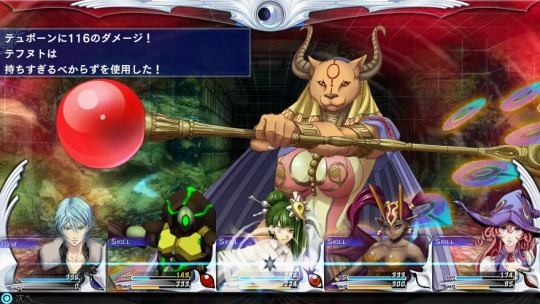
Generally, I’m not one to keep a lot of track of the RPG world, but this release has grabbed my attention recently. The Lost Child is a JRPG that takes place on modern day Tokyo, but not all is as it seems. There’s dark magic at work and it’s up to you to stop it! You’ll be battling through many different types of dungeons called “Layers” on your valiant quest. The “upgrade” system in this game, along with its turn based combat system, look absolutely amazing and make this game a must-have for any RPG fan. Although this normally isn’t the genre I tend to gravitate towards, this game has me considering sinking an obscene number of hours into it. It’s available on Switch, PS4, and PSVita, so I definitely recommend you keep an eye out for the release of this game!
Crash Remaster for Switch, PC, Xbox One (June 26th)

These last two entries are sort of honorable mentions. For those of you who don’t live the PlayStation life, the remaster of Crash Bandicoot is coming to Xbox, PC, and Switch! Whether you played the original games as a kid or not, this trilogy is a classic that would belong on ANY gamer’s favorites list, but especially if you have any interest in platformers. Obviously, it still has all the fun of the original game, but the graphics have been given a major revamp and Crash, Coco, and Cortex look better than ever! Unexpectedly, at least in my experience, this is also a fair challenging set of games. As a kid, I somehow remember being great at this game and now I’m pretty sure an actual child could surpass my so-called “skill”. Whether you’re looking for something fun and pretty or something nostalgic and challenging, this game is the answer! Check it out if you haven’t already played it on PlayStation last year.
Wolfenstein II: The New Colossus on Switch (June 29th)

The port of Wolfenstein II: The New Colossus to switch should definitely be on your radar, especially if you’re one of those people who are upset with the new Black Ops 4 not including a single player campaign. This game has all the gritty battle, beautiful graphics, challenging levels, and fantastic story telling that you could ever dream of! Now that it’s on switch, you can even take all of that joy on the go. I’m interested to see how well the graphics of the original game will port over. We’ve all seen the horrifying disaster that was WWE 2K18 on switch… so hopefully Bethesda gets this right like they have with their other recent ports! No matter what console you’re on, if you haven’t yet taken the time to play this game, this is a perfect kick in the butt… er, reminder… to get you started!
There we have it! Those are some highlights of the games being released in June. Did I miss any that you are really looking forward to? If so, I want to hear about them in the comments below or on any of my other social media pages. You can find me on facebook, twitter, and instagram as Sizzites Gaming and don’t forget to like, share, and subscribe for more videogame nonsense all the time!
#video games#upcoming releases#June 2018#PlayStation#xbox#Nintendo#switch#pc gamer#new games#the elder scolls online#teso#eso#Summerset#Vampyr#Shaq Fu#A Legend Reborn#Jurassic World#Evolution#Lego#The Incredibles#Pixar#The Lost Child#RPG#JRPG#Crash Bandicoot#Wolfenstein 2#New Colossus#WWE 2K18#side scroller#beat em up
0 notes
Text
Here we were, Day one, ready, geared up and all set to go as we assembled outside the guest house near the trekking path at 8.30 am.
Almost all of them had trekking poles except Jogen and me. Luckily the trek leader Venkat gave us spare trekking poles the previous night when we asked for it.
I can’t tell you how thankful I am for that trekking pole. I have a history, in fact a long history of accidents and injuries and chronic pain.
From falling into a 20 feet ditch from a bike and breaking my arm in a remote place in Indonesia to somersaulting from my bicycle and falling hard on my knees, the list is endless. I have a bad knee problem due to years of running on hard tracks. In addition, I was diagnosed with early arthritis years ago, a genetic pass on.
There are days in my usual routine life when it’s a challenge to climb steps and I run a cafe that has only steps all the way up the hill, equivalent to 5 floors going up and down every day. So I knew to an extent what would hurt me and what would not.
When Pankaj told me I didn’t need support and I was strong enough, I became quite convinced . Later I realized I needed to listen to my own instincts, If something doesn’t feel right, it doesn’t.
There are certain basic rules in trekking. One had to be with the team no matter what. Yes we had people with an age group starting from 18 – 66 years with different kinds of fitness levels.
Some were former athletes, some were super fit, some were sloppy, some were experienced trekkers but in the end ,we all had to be there for each other.
But to really want to be there for each other doesn’t happen just like that. It happens over a period of time as one slowly starts connecting with the others.
Sometimes with one person, sometimes with a group of them, it slowly happens. And this was Day One of the trek. We were still new to each other.
A certain kind of bonding was slowly and surely happening.
Rudra and Bhim were walking together, Kishore was the loner moving ahead yet very helpful when needed, Pankaj was following his own path checking on Jogen once a while, Jogen was making friends as he walked along, sometimes with the trek leaders, sometimes with the others, the couples were anyways with each other.
There were the friends, the Ahmedabadi group of four, the quiet guy Saikat with the DSLR camera, a brother sister friend combo, the duo who would always be together no matter what, the older gentleman Krishanu with a big smile, the trek leaders talking intermittently with the group and somewhere in between was me, looking back towards Jogen if he was ok and looking ahead.
Before we set off, Pankaj and my concern was about Jogen. More so from Pankaj as they were friends for more than 40+ years and they knew each other too well.
Jogen has Parkinson’s and he had signed up for the trek totally egged on by Pankaj but now Pankaj was really worried for him and justifiably so, yet at the same time I really wanted to tell him to let Jogen be and I did, once a while gently..
I was getting stressed out in between them initially. I didn’t know then, I realized only when I took a detour on my own after the trek.
We are always in that moment then, not really thinking about the toll it takes on our body, mind and emotions. The after effects and dissection happens only later.
It was a trek of 3-4 kms to Deorital. You think it’s nothing right? What kind of a trek is this when it’s ONLY that much?
Well, my friends what can I say as we started walking up on a solid ascent with the hot sun blazing down on us.
The first trek itself were steep ascents. We just went up and up and up. I clearly recall all of us panting at one point or the other no matter how fit one was. Some hid it well, others just let it out.
This truly required a team effort. To not walk up fast and overtake someone like a competition or to show off. To not overtake the trek leaders and the guides, they had that experience with them.
To keep our egos aside and not gloat over who is younger, who is more fitter but just go together. To not criticize certain rules that we had to follow. Well that would take some time too.
What can I say about the scenery? As we puffed and panted and stopped in between sometimes, we would watch the beautiful scenery in front of us. Each scenery showed a different picture and meaning.
As we trekked up and saw the massive Himalayan ranges, can you imagine what it does to us?
You are gasping, panting out of your comfort zone and yet one look at it calms you, soothes you because you know this is worth it and there’s lot more to go.
Manojji would stop and tell a story or two on Kedarnath, the massive Nanda Devi mountain. These were stories that came from the mountains, their folk lore and I came to respect them as time went by.
Sometimes there were pathways, sometimes none but we had to keep moving on.
My knee pain was showing up but first day right? I didn’t want to complain, didn’t want to ask for help, didn’t want to show it. Yup it happens to all of us. The EGO is right there.
As long as I was ascending it was great but I was getting petrified of steep descents as that would kill my knees.
Finally we reached Deorital.
Deorital or Devrital as the locals call it is because according to legend, the gods and goddesses (Devi) resided here. And truly when we started approaching the campsite, what we saw was beautiful and this was just the beginning.
A clear fresh Lake, a big meadow so to speak, the massive Himalayas in the background and pretty Camping tents. What a sight it was as we walked towards it!
You would think we could get into our tents and relax right? No way were our Trek Leaders going to allow us to sleep.
So the next thing after Lunch was to participate in group activities. We all scoffed at it in our minds am sure when they announced it. I remember thinking let me be, can’t I just be alone for a bit? 🙂
So Devang yup the same one with all the enthusiasm he had on a hot afternoon gave us a game to play.
So we would have to introduce ourselves with a name and add an adjective to it. But that was not it, we not only had to do that but repeat the other names and adjectives that came before us. There were 27 of us goddamn it!
And let me tell you what that game did to us. It slowly broke the ice as each one went along and used an adjective that described them and tried to remember others.
I also came to know a wee bit of their side I think. From funny to witty to their nature.
Serene Seema, Jazzy Jogen, Rebel Rudra, Wanderlust Ridhi, Rockstar Raghu, Wireless Venky, Smart Saikat, Cool Kishore, Hot someone,Nature loving someone, Mind blowing someone, the list went on and on. See? I still remember some of them even though it has been a month now 🙂
There was another activity but by this time I was done. I just wanted to read a book alone and yet at the same time I couldn’t help myself watching all of them playing virtual Basketball with shouts and laughs and more. The trek leaders were egging them on and participating wholly.
A team was forming. The dots were slowly connecting. Slowly the smiles appeared as we looked at each other or crossed our paths because every name had an adjective to it and for me, that’s how I remembered them throughout the trek.
That evening before dinner we went for a small mini trek and yup our legs could now take it. That group activity opened us a bit more as we slowly started talking to others.
Here is where I stop and say something a bit.
I am a big foodie and I love cooking, it’s therapeutic and makes me happy. I see food as a remedy, a panacea. It binds people, connects them. So anywhere I travel, I search for food, I try my best to go to those kitchens, to those people who are the reason behind it.
This time was no different to me, So I went up to Venkat, the trek leader and seriously pestered him to take me to the kitchen as I wanted to assist.
I truly wanted to spend time with the local team there sitting with them, seeing how they make it and maybe I could support a bit?
I remember every time I saw him I would ask when can I go to the kitchen?? and this started right from the time we arrived at the camp site. He finally gave in and took me in the evening to the kitchen tent.
I saw 5 pairs of eyes confused, wary as I stood inside the tent. All local guys busy making dinner and here I was an outsider wanting to ‘help’.
It took just a little bit of time for them to warm up to me. And I totally give that credit to FOOD.It bonds people big time. Making it, eating it, it all happens just like that. Everyone loosens up because we are speaking the same language.
Bhupinder ,another trek guide would make lots of jokes, made me listen to Garhwal songs, asking me questions, what movies do I like? Was I married? Which city am I from? Is it hot there? What do I eat usually?
Manojji regaling me with stories and legends of his village and the local festivals. Stories of Rohini Bhugyal and Roopkund. And how can I forget a terrifying ghost story he told me and it happened at one of the treks!
That late night when I had to answer nature’s calls in the dark with my head lamp on, I was chanting mantras and trying hard not to think about it and failing miserably!
Pratap the shy guide would only blush and smile but later he sang as I insisted I won’t leave until I listen to one Garhwali song. Ankit the cook sang along with Pratap. It was fun!
As I finished assisting them in whatever little way I could, I told them I am coming again to pester them tomorrow. I wanted to assist and spend time with them.
Manojji said you can come any time. It’s good to see people from the trek interacting with us like this. Dil ko accha laga.
I was overwhelmed. In fact, I had to thank them profusely for letting me into their world just a little bit..
As I went back to the tent to join Pankaj and Jogen, I looked up and saw a beautiful sky, the mountains looming large around us. The lake, the trees, the joy one experiences seeing it…
Tomorrow would be a big Day as we would be tested, quite hard.
It would be the longest one – a 14 km trek to be precise..
Trekkers, Ice-Breakers & Emotions – Part III Here we were, Day one, ready, geared up and all set to go as we assembled outside the guest house near the trekking path at 8.30 am.
0 notes
Text
Augusta National chairman Billy Payne is always the most interesting person in the room
[This story originally appeared in Sports Illustrated Golf+ in April 2016.]
Some months ago my boss (or one of them) assigned me an interesting story for this issue: Jeff Knox, the amateur golfer and Augusta National member who often plays as a marker on Masters weekends. He has given interviews after some of his rounds, and my best guess was that if Knox wanted to do the story -- and if Billy Payne, the club's chairman since 2006, gave his approval -- it would happen. I wrote to Knox, and he referred my query to a media official at the club, who responded thusly:
"Mr. Knox fields many requests such as yours on an annual basis. He sends them my way because he respects the tradition of Mr. Payne being the sole voice of the Club. As you may know, our members do not give interviews on matters relative to the Club and Masters."
That day I asked my boss if I could write up Billy Payne for the issue instead. I mean, who wouldn't want to know more about the man who runs the Masters, which Tim Finchem, the PGA Tour commissioner, calls the "strongest brand" in golf? Who wouldn't want to know more about the man and the "sole voice" behind the most famous and influential golf club in America?
My boss said yes. My colleague Gary Van Sickle took over the Knox story. Through a spokesman, Payne declined interview and photo requests. (He makes himself available to reporters three times a year, and I was out of cycle.) Fortunately others were willing to talk, including club employees, members, Tour players, caddies, Augustans and golf officials. Understandably they were skittish about being quoted. Every chairman of Augusta National has engendered some degree of awe and fear, even if the chairman is as suave as the current one. I just thought you should know the obstacles. End of preamble.
As they say on the 1st tee at the Masters, Fore please. Billy Payne now driving.
Augusta National Golf Club has never had a chairman like William Porter Payne, not even Clifford Roberts, a sui generis personality and Wall Street banker who founded the club in 1933 with Bobby Jones, the great amateur. Payne, a 68-year-old businessman and attorney from Atlanta who was the key figure in bringing the Olympics to the city in 1996, often cites the club's two patron saints as his ultimate inspiration. But their vision was distinctly inward. That is: the club, the club, the club. It is unlikely that either could have imagined what Chairman Payne—he likes when people use the title—has done in his near decade at Augusta's helm. No other chairman has thought to focus on the borders of the course, and the great, green world beyond them.
Among other things, Payne has taken on grow-the-game with evangelical verve. He once said, in the fancy-speak that typifies many of his public remarks, "What we've done is do what we're supposed to do, and that is to be a beacon in the world of golf and to do our best to influence others to want to be a part of it." And where Jones prized camaraderie and fellowship above all, Payne is trying to achieve perfection. He wants the tournament experience for players, fans and television viewers to meet his own outsized standards.
MORE MASTERS: The history of the green jacket
In public Payne is so reverent about the club that some guests are surprised to see what a regular guy he can be when the necktie comes off. He has been known to share insider stories, from long before his time at Augusta National, about Eisenhower on the course, gambling in the clubhouse and members bringing in women "over the fence" at night. His listeners are thunderstruck. Wherever he goes, Payne is the most interesting person in the room.
It's pro bono work, being the chairman of Augusta National, but it is also golf's ultimate high-status position. Payne, whose bad back in recent years has limited his golf—he can shoot in the 80s and sometimes lower—does not spend Masters week running from one party to another. Nothing like it. He is a creature of habit, and his habits are low-key. He represents the club at the champions dinner held the Tuesday before the start of the tournament. The next day he holds his annual state-of-the-Masters press conference. After that, he is seldom seen until Sunday night, when he presides over the postgame festivities. He watches the tournament's TV coverage closely in his office and keeps tabs on threatening storm systems on a computer. Yes, in a perfect world the club chairman would control the weather and who makes which putts. But there are limits to what even Billy Payne can do.
This list of Payne's achievements is limited to 10 items only by convention.
1. Payne—who inherited an all-male membership—invited three women to join the club, starting in 2012 with former Secretary of State Condoleezza Rice and businesswoman Darla Moore. These admissions were a relief to the PGA Tour, which pays lip service to inclusiveness. They also made life easier for some club members, particularly those with large public profiles, such as Roger Goodell of the NFL, Jerry Yang of Yahoo and Bill Gates of the Bill & Melinda Gates Foundation.
2. Payne started two major amateur events, the Latin America Amateur and the Asia-Pacific Amateur, the winners of which are invited to play in the Masters. As a result, a pair of teenagers will tee it up at Augusta this year: Paul Chaplet, 16, of Costa Rica and Jin Cheng, 18, of China. (Grow-the-game I.)
3. Working with the USGA and the PGA of America, Payne in 2014 rolled out a national junior competition called Drive, Chip & Putt. Across the country, thousands of kids played in approximately 250 qualifying events, winnowing down the group to 80 boys and girls who will convene at Augusta National on the Sunday before the Masters to play in the finals. (Grow-the-game II.)
4. Payne has overseen an enormous expansion, nationally and internationally, of the tournament's coverage on broadcast and cable TV and particularly by way of the Internet. Viewers may now see far more of the Masters, including the Wednesday par-3 tournament and press conferences, and have far speedier access to more tournament information. (Grow-the-game III.)
5. Payne took over an already financially secure not-for-profit club and vastly improved its balance sheet, to the point where it plans to purchase, reportedly for $27 million and without any real hesitancy, a small strip of land from the adjacent Augusta Country Club. One goal is to give the club the option of lengthening Augusta National's iconic 510-yard, par-5 13th hole. Another is to give the club more of a buffer from its bustling neighbor. Payne is not afraid to spend the club's money. He has hired high-level executives from Disney, Ritz-Carlton and other brand-name companies to help run the business of the Masters, most particularly in marketing and merchandising. (Spend-money-to-make-money I.)
MORE MASTERS: Meet the man who declined 20 Masters invites
6. Payne has dramatically increased the dining and beverage options for some big-ticket patrons. He oversaw the construction of a sprawling entertainment complex of high-end restaurants, bars and flat-screen TVs off the 5th hole called Berckmans Place, which opened in 2013. This mall in the pines measures 90,000 square feet, not including the three putting greens that abut it. It's open one week a year, and it makes money. Guests, who typically spend about $6,000 for a badge, might see Rice or Lynn Swann, among other recognizable members, representing the club as greeters. (Spend-money-to-make-money II.)
7. Payne oversaw the building of an 18-acre driving range on a former parking lot along with a smallish caddie clubhouse at the far end, in a spot so private that some players prefer it to the actual clubhouse, where they are likely to encounter various people—family members and reporters, for instance—who seek to occupy their time.
8. Under Payne, the club arranged for the purchase of dozens of homes on a neighboring housing development, razed them and turned the 120 rolling acres into a grass-and-gravel—and free!—parking lot that for 51 weeks a year looks like a cemetery waiting for clients. Related to that, Payne arranged for the club to lend money to the city of Augusta for a rerouting of Berckmans Road, which parallels the west side of the course, a move that improves traffic flow during the tournament and gives the club more of a buffer from public incursions.
9. Payne oversaw the stately, solemn burial of the club's iconic Eisenhower Tree, a landmark of the 17th hole until an ice storm led to its demise in 2014. "The loss of the Eisenhower Tree is difficult news to accept," Payne said at the time in a statement. Funeral services, as you would expect, were private.
10. In keeping with tradition, Payne has made sure the club does not gouge its fans. The club's famous pimento cheese sandwich goes for $1.50, the same price it was when he became chairman.
Billy Payne is not a beloved figure at the club, as was one of his predecessors, Jack Stephens, an Arkansas billionaire. Payne played football at Georgia and was active in his fraternity, Phi Delta Theta, but he is nothing like a good old boy, as was another chairman, Hord Hardin. Payne is not deeply frugal, as was Cliff Roberts (who was almost comically so), and he is not steeped in the lore of golf, as was Jones.
But he developed a creative and ambitious to-do list, and he has applied himself to it with remarkable effectiveness. Payne has a group of members and employees willing to move heaven and earth to help him fulfill his vision. And yet his position comes with a hurdle that would require someone with Shakespeare's insights into power to truly explore. Anything connected to Augusta National or the Masters is loaded with cachet—overloaded, really—and every day, directly or indirectly, the chairman encounters people eager to curry favor with him. He holds all the cards, which means he faces the same problem all emperors do: Who are the people who tell him what he actually needs to hear?
Payne typically works quietly. When longtime club manager Jim Armstrong retired in 2013, Payne made him a member, and there was certainly no press release about that. (There was when Rice and Moore joined.) Under Payne's watch, the club has substantially increased its charitable giving, with millions upon millions distributed annually, but specific numbers are hard to find. To promote them would be showy and gauche, and that is not the club's way.
But Payne is no wallflower. Not at all. When Tiger Woods played in the 2010 Masters, his first tournament after his infamous sex scandal, Payne read a 284-word statement about how the golfer "disappointed all of us," concluding with the importance of "second chances." Depending on whom you ask, his remarks were either hopeful and necessary or sanctimonious and presumptuous. Few are neutral about Billy Payne.
"I like Billy," Vijay Singh said during the Florida swing, when all of golf starts thinking about the Masters, which Singh won in 2000. "Augusta has to be run with a firm hand, and Billy has it. It's part of what makes Augusta Augusta."
Given the source, it's a magnificent compliment. One thing about Singh: He would never try to curry favor with anybody, not even the chairman of the Augusta National Golf Club.
Among former champions, Jack Nicklaus and Arnold Palmer, who are dues-paying members of the club, broadly share Singh's view. But Nicklaus has a different relationship with Payne than he did with any of Payne's five predecessors. Beginning in the early 1970s, Nicklaus, a prominent architect and a six-time Masters winner, was regularly consulted about proposed changes to the course. Under Payne, who has made little more than tweaks to various holes, nothing like that has happened. Nicklaus has good company. Other former winners have also found Payne unreceptive to suggestions.
Payne, like Palmer, venerates the club's distinctive green jacket, worn by members and Masters winners when they are at the club, but never off-campus, except by the reigning champion. When a green jacket once belonging to Art Wall, the 1959 winner, was bought by a private collector in 2012 for nearly $62,000, the club arranged to get the jacket back and return it to Augusta National. Payne, by special dispensation, allows members who attend the two new amateur events to wear their club coats overseas. He once observed, "The green jacket doesn't need a lot of interpretation anywhere in the world."
Appearance is important to Payne. For instance, members have learned that the chairman does not like the loafers-no-socks look. During one members' weekend Payne instructed pro-shop staffers to distribute hosiery to any sockless person. Members and guests are still required to wear long pants while playing. On one pre-Masters visit, Woods, unaware of the dress code, arrived in shorts and ended up playing in rain pants.
Payne keeps track of every aspect of the club and measures virtually anything that can be measured. There have been members who have been told they are playing the course too much, and at least one member, race car legend Roger Penske, was informed by letter he was not coming around enough. The letter to Penske, who lives outside of Detroit, was ultimately about Payne's goal of increasing member participation in the club. (Penske declined an interview request.) One of Payne's objectives is to make the club, with members from all over the country—and to a degree, the world—feel more like a club.
He wants life at Augusta National to unfold in a genteel and time-honored way, and he will use modern means to get it. Club members and employees say that Payne has installed video cameras in trees on the course. How else, they ask, could Payne know immediately after a round that a member had permitted a caddie to drive a cart on the course, or violate any other Payne edict? For decades Frank Broyles, the retired Arkansas football coach and longtime member, would play 36 holes a day on his Augusta visits, getting lunch from the clubhouse in takeout containers between rounds. Payne put an end to that practice, telling the coach to have a proper lunch in the clubhouse, which is what he now does. "It's very convenient," Broyles said the other day of his new custom. There was not even a hint of complaint in his voice, and he said he is still—at 91!—able to go around twice in a day at Augusta. Broyles joined the club nearly a half-century ago, when Roberts was chairman. "Mr. Payne runs the club just like Mr. Roberts did," Broyles said, which he meant as a compliment. Both chairmen, to get it down to a word, were particular.
One day Knox, the club's best player, was hitting balls. Payne approached him, and their conversation, in club lore, supposedly went like this:
"Jeff, who you playing with today?""Oh, I'm not playing today, Mr. Payne. I'm just hitting balls.""Jeff, why don't we say you go over to the country club and hit your balls there?" That is, the Augusta Country Club.
Now, is a man of Payne's sophistication actually going to say that to a fellow and distinguished member? Not likely. What is far more realistic is that Payne told Knox that the range he was using was meant as a warmup area, not for long practice sessions. But the exchange, regardless of what was actually said, is all part of a piece: Payne has a vision for every aspect of the club, and he is determined to see it fulfilled. It's as if he has taken a solemn oath to protect tradition. He holds himself up as the club's ultimate role model, and he does what he needs to do to maintain authority. He didn't take the job to win popularity contests.
During the dessert course of a recent champions dinner, Bernhard Langer, a two-time Masters winner, talked about a hole he thinks could be improved, the bunker-free 14th. Visually he doesn't like the tee shot, he told his fellow champions and the chairman. The green, he said, is too severe.
Payne cut him off.
"This is not the time or place for this kind of discussion," Payne said, as the conversation has been recounted.“Then when is a good time?" Langer asked."Write a letter," Payne replied, banging the dinner table and announcing, "This dinner is adjourned!"
Some of the champions responded with nervous laughter. Others sat in stunned silence. Langer was steaming.
Let’s not end on that discordant note. After all, what have Augusta National and the Masters done for any of us except enrich our lives? If you visit the club as a guest, the experience of being there and playing the course is pretty much the same as it ever was. Payne's efforts have made attending the Masters more convenient than ever, even if it there are shades of Disneyland to the place now. His grow-the-game initiatives will introduce millions of people to golf. It's all good.
William (Hootie) Johnson, Payne's predecessor, served as chairman for about eight years, and Johnson's predecessor, Jack Stephens, served for seven. Before that, Hardin was in the position for about 11 years. Payne's 10-year anniversary comes in early May, and there has been plenty of talk at Augusta about who could possibly succeed him. Various names are offered in these discussions, but all of the potential candidates have one serious flaw.
They are not William Porter Payne.
0 notes
Text
Augusta National chairman Billy Payne is always the most interesting person in the room
[This story originally appeared in Sports Illustrated Golf+ in April 2016.]
Some months ago my boss (or one of them) assigned me an interesting story for this issue: Jeff Knox, the amateur golfer and Augusta National member who often plays as a marker on Masters weekends. He has given interviews after some of his rounds, and my best guess was that if Knox wanted to do the story -- and if Billy Payne, the club's chairman since 2006, gave his approval -- it would happen. I wrote to Knox, and he referred my query to a media official at the club, who responded thusly:
"Mr. Knox fields many requests such as yours on an annual basis. He sends them my way because he respects the tradition of Mr. Payne being the sole voice of the Club. As you may know, our members do not give interviews on matters relative to the Club and Masters."
That day I asked my boss if I could write up Billy Payne for the issue instead. I mean, who wouldn't want to know more about the man who runs the Masters, which Tim Finchem, the PGA Tour commissioner, calls the "strongest brand" in golf? Who wouldn't want to know more about the man and the "sole voice" behind the most famous and influential golf club in America?
My boss said yes. My colleague Gary Van Sickle took over the Knox story. Through a spokesman, Payne declined interview and photo requests. (He makes himself available to reporters three times a year, and I was out of cycle.) Fortunately others were willing to talk, including club employees, members, Tour players, caddies, Augustans and golf officials. Understandably they were skittish about being quoted. Every chairman of Augusta National has engendered some degree of awe and fear, even if the chairman is as suave as the current one. I just thought you should know the obstacles. End of preamble.
As they say on the 1st tee at the Masters, Fore please. Billy Payne now driving.
Augusta National Golf Club has never had a chairman like William Porter Payne, not even Clifford Roberts, a sui generis personality and Wall Street banker who founded the club in 1933 with Bobby Jones, the great amateur. Payne, a 68-year-old businessman and attorney from Atlanta who was the key figure in bringing the Olympics to the city in 1996, often cites the club's two patron saints as his ultimate inspiration. But their vision was distinctly inward. That is: the club, the club, the club. It is unlikely that either could have imagined what Chairman Payne—he likes when people use the title—has done in his near decade at Augusta's helm. No other chairman has thought to focus on the borders of the course, and the great, green world beyond them.
Among other things, Payne has taken on grow-the-game with evangelical verve. He once said, in the fancy-speak that typifies many of his public remarks, "What we've done is do what we're supposed to do, and that is to be a beacon in the world of golf and to do our best to influence others to want to be a part of it." And where Jones prized camaraderie and fellowship above all, Payne is trying to achieve perfection. He wants the tournament experience for players, fans and television viewers to meet his own outsized standards.
MORE MASTERS: The history of the green jacket
In public Payne is so reverent about the club that some guests are surprised to see what a regular guy he can be when the necktie comes off. He has been known to share insider stories, from long before his time at Augusta National, about Eisenhower on the course, gambling in the clubhouse and members bringing in women "over the fence" at night. His listeners are thunderstruck. Wherever he goes, Payne is the most interesting person in the room.
It's pro bono work, being the chairman of Augusta National, but it is also golf's ultimate high-status position. Payne, whose bad back in recent years has limited his golf—he can shoot in the 80s and sometimes lower—does not spend Masters week running from one party to another. Nothing like it. He is a creature of habit, and his habits are low-key. He represents the club at the champions dinner held the Tuesday before the start of the tournament. The next day he holds his annual state-of-the-Masters press conference. After that, he is seldom seen until Sunday night, when he presides over the postgame festivities. He watches the tournament's TV coverage closely in his office and keeps tabs on threatening storm systems on a computer. Yes, in a perfect world the club chairman would control the weather and who makes which putts. But there are limits to what even Billy Payne can do.
This list of Payne's achievements is limited to 10 items only by convention.
1. Payne—who inherited an all-male membership—invited three women to join the club, starting in 2012 with former Secretary of State Condoleezza Rice and businesswoman Darla Moore. These admissions were a relief to the PGA Tour, which pays lip service to inclusiveness. They also made life easier for some club members, particularly those with large public profiles, such as Roger Goodell of the NFL, Jerry Yang of Yahoo and Bill Gates of the Bill & Melinda Gates Foundation.
2. Payne started two major amateur events, the Latin America Amateur and the Asia-Pacific Amateur, the winners of which are invited to play in the Masters. As a result, a pair of teenagers will tee it up at Augusta this year: Paul Chaplet, 16, of Costa Rica and Jin Cheng, 18, of China. (Grow-the-game I.)
3. Working with the USGA and the PGA of America, Payne in 2014 rolled out a national junior competition called Drive, Chip & Putt. Across the country, thousands of kids played in approximately 250 qualifying events, winnowing down the group to 80 boys and girls who will convene at Augusta National on the Sunday before the Masters to play in the finals. (Grow-the-game II.)
4. Payne has overseen an enormous expansion, nationally and internationally, of the tournament's coverage on broadcast and cable TV and particularly by way of the Internet. Viewers may now see far more of the Masters, including the Wednesday par-3 tournament and press conferences, and have far speedier access to more tournament information. (Grow-the-game III.)
5. Payne took over an already financially secure not-for-profit club and vastly improved its balance sheet, to the point where it plans to purchase, reportedly for $27 million and without any real hesitancy, a small strip of land from the adjacent Augusta Country Club. One goal is to give the club the option of lengthening Augusta National's iconic 510-yard, par-5 13th hole. Another is to give the club more of a buffer from its bustling neighbor. Payne is not afraid to spend the club's money. He has hired high-level executives from Disney, Ritz-Carlton and other brand-name companies to help run the business of the Masters, most particularly in marketing and merchandising. (Spend-money-to-make-money I.)
MORE MASTERS: Meet the man who declined 20 Masters invites
6. Payne has dramatically increased the dining and beverage options for some big-ticket patrons. He oversaw the construction of a sprawling entertainment complex of high-end restaurants, bars and flat-screen TVs off the 5th hole called Berckmans Place, which opened in 2013. This mall in the pines measures 90,000 square feet, not including the three putting greens that abut it. It's open one week a year, and it makes money. Guests, who typically spend about $6,000 for a badge, might see Rice or Lynn Swann, among other recognizable members, representing the club as greeters. (Spend-money-to-make-money II.)
7. Payne oversaw the building of an 18-acre driving range on a former parking lot along with a smallish caddie clubhouse at the far end, in a spot so private that some players prefer it to the actual clubhouse, where they are likely to encounter various people—family members and reporters, for instance—who seek to occupy their time.
8. Under Payne, the club arranged for the purchase of dozens of homes on a neighboring housing development, razed them and turned the 120 rolling acres into a grass-and-gravel—and free!—parking lot that for 51 weeks a year looks like a cemetery waiting for clients. Related to that, Payne arranged for the club to lend money to the city of Augusta for a rerouting of Berckmans Road, which parallels the west side of the course, a move that improves traffic flow during the tournament and gives the club more of a buffer from public incursions.
9. Payne oversaw the stately, solemn burial of the club's iconic Eisenhower Tree, a landmark of the 17th hole until an ice storm led to its demise in 2014. "The loss of the Eisenhower Tree is difficult news to accept," Payne said at the time in a statement. Funeral services, as you would expect, were private.
10. In keeping with tradition, Payne has made sure the club does not gouge its fans. The club's famous pimento cheese sandwich goes for $1.50, the same price it was when he became chairman.
Billy Payne is not a beloved figure at the club, as was one of his predecessors, Jack Stephens, an Arkansas billionaire. Payne played football at Georgia and was active in his fraternity, Phi Delta Theta, but he is nothing like a good old boy, as was another chairman, Hord Hardin. Payne is not deeply frugal, as was Cliff Roberts (who was almost comically so), and he is not steeped in the lore of golf, as was Jones.
But he developed a creative and ambitious to-do list, and he has applied himself to it with remarkable effectiveness. Payne has a group of members and employees willing to move heaven and earth to help him fulfill his vision. And yet his position comes with a hurdle that would require someone with Shakespeare's insights into power to truly explore. Anything connected to Augusta National or the Masters is loaded with cachet—overloaded, really—and every day, directly or indirectly, the chairman encounters people eager to curry favor with him. He holds all the cards, which means he faces the same problem all emperors do: Who are the people who tell him what he actually needs to hear?
Payne typically works quietly. When longtime club manager Jim Armstrong retired in 2013, Payne made him a member, and there was certainly no press release about that. (There was when Rice and Moore joined.) Under Payne's watch, the club has substantially increased its charitable giving, with millions upon millions distributed annually, but specific numbers are hard to find. To promote them would be showy and gauche, and that is not the club's way.
But Payne is no wallflower. Not at all. When Tiger Woods played in the 2010 Masters, his first tournament after his infamous sex scandal, Payne read a 284-word statement about how the golfer "disappointed all of us," concluding with the importance of "second chances." Depending on whom you ask, his remarks were either hopeful and necessary or sanctimonious and presumptuous. Few are neutral about Billy Payne.
"I like Billy," Vijay Singh said during the Florida swing, when all of golf starts thinking about the Masters, which Singh won in 2000. "Augusta has to be run with a firm hand, and Billy has it. It's part of what makes Augusta Augusta."
Given the source, it's a magnificent compliment. One thing about Singh: He would never try to curry favor with anybody, not even the chairman of the Augusta National Golf Club.
Among former champions, Jack Nicklaus and Arnold Palmer, who are dues-paying members of the club, broadly share Singh's view. But Nicklaus has a different relationship with Payne than he did with any of Payne's five predecessors. Beginning in the early 1970s, Nicklaus, a prominent architect and a six-time Masters winner, was regularly consulted about proposed changes to the course. Under Payne, who has made little more than tweaks to various holes, nothing like that has happened. Nicklaus has good company. Other former winners have also found Payne unreceptive to suggestions.
Payne, like Palmer, venerates the club's distinctive green jacket, worn by members and Masters winners when they are at the club, but never off-campus, except by the reigning champion. When a green jacket once belonging to Art Wall, the 1959 winner, was bought by a private collector in 2012 for nearly $62,000, the club arranged to get the jacket back and return it to Augusta National. Payne, by special dispensation, allows members who attend the two new amateur events to wear their club coats overseas. He once observed, "The green jacket doesn't need a lot of interpretation anywhere in the world."
Appearance is important to Payne. For instance, members have learned that the chairman does not like the loafers-no-socks look. During one members' weekend Payne instructed pro-shop staffers to distribute hosiery to any sockless person. Members and guests are still required to wear long pants while playing. On one pre-Masters visit, Woods, unaware of the dress code, arrived in shorts and ended up playing in rain pants.
Payne keeps track of every aspect of the club and measures virtually anything that can be measured. There have been members who have been told they are playing the course too much, and at least one member, race car legend Roger Penske, was informed by letter he was not coming around enough. The letter to Penske, who lives outside of Detroit, was ultimately about Payne's goal of increasing member participation in the club. (Penske declined an interview request.) One of Payne's objectives is to make the club, with members from all over the country—and to a degree, the world—feel more like a club.
He wants life at Augusta National to unfold in a genteel and time-honored way, and he will use modern means to get it. Club members and employees say that Payne has installed video cameras in trees on the course. How else, they ask, could Payne know immediately after a round that a member had permitted a caddie to drive a cart on the course, or violate any other Payne edict? For decades Frank Broyles, the retired Arkansas football coach and longtime member, would play 36 holes a day on his Augusta visits, getting lunch from the clubhouse in takeout containers between rounds. Payne put an end to that practice, telling the coach to have a proper lunch in the clubhouse, which is what he now does. "It's very convenient," Broyles said the other day of his new custom. There was not even a hint of complaint in his voice, and he said he is still—at 91!—able to go around twice in a day at Augusta. Broyles joined the club nearly a half-century ago, when Roberts was chairman. "Mr. Payne runs the club just like Mr. Roberts did," Broyles said, which he meant as a compliment. Both chairmen, to get it down to a word, were particular.
One day Knox, the club's best player, was hitting balls. Payne approached him, and their conversation, in club lore, supposedly went like this:
"Jeff, who you playing with today?""Oh, I'm not playing today, Mr. Payne. I'm just hitting balls.""Jeff, why don't we say you go over to the country club and hit your balls there?" That is, the Augusta Country Club.
Now, is a man of Payne's sophistication actually going to say that to a fellow and distinguished member? Not likely. What is far more realistic is that Payne told Knox that the range he was using was meant as a warmup area, not for long practice sessions. But the exchange, regardless of what was actually said, is all part of a piece: Payne has a vision for every aspect of the club, and he is determined to see it fulfilled. It's as if he has taken a solemn oath to protect tradition. He holds himself up as the club's ultimate role model, and he does what he needs to do to maintain authority. He didn't take the job to win popularity contests.
During the dessert course of a recent champions dinner, Bernhard Langer, a two-time Masters winner, talked about a hole he thinks could be improved, the bunker-free 14th. Visually he doesn't like the tee shot, he told his fellow champions and the chairman. The green, he said, is too severe.
Payne cut him off.
"This is not the time or place for this kind of discussion," Payne said, as the conversation has been recounted.“Then when is a good time?" Langer asked."Write a letter," Payne replied, banging the dinner table and announcing, "This dinner is adjourned!"
Some of the champions responded with nervous laughter. Others sat in stunned silence. Langer was steaming.
Let’s not end on that discordant note. After all, what have Augusta National and the Masters done for any of us except enrich our lives? If you visit the club as a guest, the experience of being there and playing the course is pretty much the same as it ever was. Payne's efforts have made attending the Masters more convenient than ever, even if it there are shades of Disneyland to the place now. His grow-the-game initiatives will introduce millions of people to golf. It's all good.
William (Hootie) Johnson, Payne's predecessor, served as chairman for about eight years, and Johnson's predecessor, Jack Stephens, served for seven. Before that, Hardin was in the position for about 11 years. Payne's 10-year anniversary comes in early May, and there has been plenty of talk at Augusta about who could possibly succeed him. Various names are offered in these discussions, but all of the potential candidates have one serious flaw.
They are not William Porter Payne.
Brought to you bySouthern Pines Golf & CC
0 notes
Text
Augusta National chairman Billy Payne is always the most interesting person in the room
[This story originally appeared in Sports Illustrated Golf+ in April 2016.]
Some months ago my boss (or one of them) assigned me an interesting story for this issue: Jeff Knox, the amateur golfer and Augusta National member who often plays as a marker on Masters weekends. He has given interviews after some of his rounds, and my best guess was that if Knox wanted to do the story -- and if Billy Payne, the club's chairman since 2006, gave his approval -- it would happen. I wrote to Knox, and he referred my query to a media official at the club, who responded thusly:
"Mr. Knox fields many requests such as yours on an annual basis. He sends them my way because he respects the tradition of Mr. Payne being the sole voice of the Club. As you may know, our members do not give interviews on matters relative to the Club and Masters."
That day I asked my boss if I could write up Billy Payne for the issue instead. I mean, who wouldn't want to know more about the man who runs the Masters, which Tim Finchem, the PGA Tour commissioner, calls the "strongest brand" in golf? Who wouldn't want to know more about the man and the "sole voice" behind the most famous and influential golf club in America?
My boss said yes. My colleague Gary Van Sickle took over the Knox story. Through a spokesman, Payne declined interview and photo requests. (He makes himself available to reporters three times a year, and I was out of cycle.) Fortunately others were willing to talk, including club employees, members, Tour players, caddies, Augustans and golf officials. Understandably they were skittish about being quoted. Every chairman of Augusta National has engendered some degree of awe and fear, even if the chairman is as suave as the current one. I just thought you should know the obstacles. End of preamble.
As they say on the 1st tee at the Masters, Fore please. Billy Payne now driving.
Augusta National Golf Club has never had a chairman like William Porter Payne, not even Clifford Roberts, a sui generis personality and Wall Street banker who founded the club in 1933 with Bobby Jones, the great amateur. Payne, a 68-year-old businessman and attorney from Atlanta who was the key figure in bringing the Olympics to the city in 1996, often cites the club's two patron saints as his ultimate inspiration. But their vision was distinctly inward. That is: the club, the club, the club. It is unlikely that either could have imagined what Chairman Payne—he likes when people use the title—has done in his near decade at Augusta's helm. No other chairman has thought to focus on the borders of the course, and the great, green world beyond them.
Among other things, Payne has taken on grow-the-game with evangelical verve. He once said, in the fancy-speak that typifies many of his public remarks, "What we've done is do what we're supposed to do, and that is to be a beacon in the world of golf and to do our best to influence others to want to be a part of it." And where Jones prized camaraderie and fellowship above all, Payne is trying to achieve perfection. He wants the tournament experience for players, fans and television viewers to meet his own outsized standards.
MORE MASTERS: The history of the green jacket
In public Payne is so reverent about the club that some guests are surprised to see what a regular guy he can be when the necktie comes off. He has been known to share insider stories, from long before his time at Augusta National, about Eisenhower on the course, gambling in the clubhouse and members bringing in women "over the fence" at night. His listeners are thunderstruck. Wherever he goes, Payne is the most interesting person in the room.
It's pro bono work, being the chairman of Augusta National, but it is also golf's ultimate high-status position. Payne, whose bad back in recent years has limited his golf—he can shoot in the 80s and sometimes lower—does not spend Masters week running from one party to another. Nothing like it. He is a creature of habit, and his habits are low-key. He represents the club at the champions dinner held the Tuesday before the start of the tournament. The next day he holds his annual state-of-the-Masters press conference. After that, he is seldom seen until Sunday night, when he presides over the postgame festivities. He watches the tournament's TV coverage closely in his office and keeps tabs on threatening storm systems on a computer. Yes, in a perfect world the club chairman would control the weather and who makes which putts. But there are limits to what even Billy Payne can do.
This list of Payne's achievements is limited to 10 items only by convention.
1. Payne—who inherited an all-male membership—invited three women to join the club, starting in 2012 with former Secretary of State Condoleezza Rice and businesswoman Darla Moore. These admissions were a relief to the PGA Tour, which pays lip service to inclusiveness. They also made life easier for some club members, particularly those with large public profiles, such as Roger Goodell of the NFL, Jerry Yang of Yahoo and Bill Gates of the Bill & Melinda Gates Foundation.
2. Payne started two major amateur events, the Latin America Amateur and the Asia-Pacific Amateur, the winners of which are invited to play in the Masters. As a result, a pair of teenagers will tee it up at Augusta this year: Paul Chaplet, 16, of Costa Rica and Jin Cheng, 18, of China. (Grow-the-game I.)
3. Working with the USGA and the PGA of America, Payne in 2014 rolled out a national junior competition called Drive, Chip & Putt. Across the country, thousands of kids played in approximately 250 qualifying events, winnowing down the group to 80 boys and girls who will convene at Augusta National on the Sunday before the Masters to play in the finals. (Grow-the-game II.)
4. Payne has overseen an enormous expansion, nationally and internationally, of the tournament's coverage on broadcast and cable TV and particularly by way of the Internet. Viewers may now see far more of the Masters, including the Wednesday par-3 tournament and press conferences, and have far speedier access to more tournament information. (Grow-the-game III.)
5. Payne took over an already financially secure not-for-profit club and vastly improved its balance sheet, to the point where it plans to purchase, reportedly for $27 million and without any real hesitancy, a small strip of land from the adjacent Augusta Country Club. One goal is to give the club the option of lengthening Augusta National's iconic 510-yard, par-5 13th hole. Another is to give the club more of a buffer from its bustling neighbor. Payne is not afraid to spend the club's money. He has hired high-level executives from Disney, Ritz-Carlton and other brand-name companies to help run the business of the Masters, most particularly in marketing and merchandising. (Spend-money-to-make-money I.)
MORE MASTERS: Meet the man who declined 20 Masters invites
6. Payne has dramatically increased the dining and beverage options for some big-ticket patrons. He oversaw the construction of a sprawling entertainment complex of high-end restaurants, bars and flat-screen TVs off the 5th hole called Berckmans Place, which opened in 2013. This mall in the pines measures 90,000 square feet, not including the three putting greens that abut it. It's open one week a year, and it makes money. Guests, who typically spend about $6,000 for a badge, might see Rice or Lynn Swann, among other recognizable members, representing the club as greeters. (Spend-money-to-make-money II.)
7. Payne oversaw the building of an 18-acre driving range on a former parking lot along with a smallish caddie clubhouse at the far end, in a spot so private that some players prefer it to the actual clubhouse, where they are likely to encounter various people—family members and reporters, for instance—who seek to occupy their time.
8. Under Payne, the club arranged for the purchase of dozens of homes on a neighboring housing development, razed them and turned the 120 rolling acres into a grass-and-gravel—and free!—parking lot that for 51 weeks a year looks like a cemetery waiting for clients. Related to that, Payne arranged for the club to lend money to the city of Augusta for a rerouting of Berckmans Road, which parallels the west side of the course, a move that improves traffic flow during the tournament and gives the club more of a buffer from public incursions.
9. Payne oversaw the stately, solemn burial of the club's iconic Eisenhower Tree, a landmark of the 17th hole until an ice storm led to its demise in 2014. "The loss of the Eisenhower Tree is difficult news to accept," Payne said at the time in a statement. Funeral services, as you would expect, were private.
10. In keeping with tradition, Payne has made sure the club does not gouge its fans. The club's famous pimento cheese sandwich goes for $1.50, the same price it was when he became chairman.
Billy Payne is not a beloved figure at the club, as was one of his predecessors, Jack Stephens, an Arkansas billionaire. Payne played football at Georgia and was active in his fraternity, Phi Delta Theta, but he is nothing like a good old boy, as was another chairman, Hord Hardin. Payne is not deeply frugal, as was Cliff Roberts (who was almost comically so), and he is not steeped in the lore of golf, as was Jones.
But he developed a creative and ambitious to-do list, and he has applied himself to it with remarkable effectiveness. Payne has a group of members and employees willing to move heaven and earth to help him fulfill his vision. And yet his position comes with a hurdle that would require someone with Shakespeare's insights into power to truly explore. Anything connected to Augusta National or the Masters is loaded with cachet—overloaded, really—and every day, directly or indirectly, the chairman encounters people eager to curry favor with him. He holds all the cards, which means he faces the same problem all emperors do: Who are the people who tell him what he actually needs to hear?
Payne typically works quietly. When longtime club manager Jim Armstrong retired in 2013, Payne made him a member, and there was certainly no press release about that. (There was when Rice and Moore joined.) Under Payne's watch, the club has substantially increased its charitable giving, with millions upon millions distributed annually, but specific numbers are hard to find. To promote them would be showy and gauche, and that is not the club's way.
But Payne is no wallflower. Not at all. When Tiger Woods played in the 2010 Masters, his first tournament after his infamous sex scandal, Payne read a 284-word statement about how the golfer "disappointed all of us," concluding with the importance of "second chances." Depending on whom you ask, his remarks were either hopeful and necessary or sanctimonious and presumptuous. Few are neutral about Billy Payne.
"I like Billy," Vijay Singh said during the Florida swing, when all of golf starts thinking about the Masters, which Singh won in 2000. "Augusta has to be run with a firm hand, and Billy has it. It's part of what makes Augusta Augusta."
Given the source, it's a magnificent compliment. One thing about Singh: He would never try to curry favor with anybody, not even the chairman of the Augusta National Golf Club.
Among former champions, Jack Nicklaus and Arnold Palmer, who are dues-paying members of the club, broadly share Singh's view. But Nicklaus has a different relationship with Payne than he did with any of Payne's five predecessors. Beginning in the early 1970s, Nicklaus, a prominent architect and a six-time Masters winner, was regularly consulted about proposed changes to the course. Under Payne, who has made little more than tweaks to various holes, nothing like that has happened. Nicklaus has good company. Other former winners have also found Payne unreceptive to suggestions.
Payne, like Palmer, venerates the club's distinctive green jacket, worn by members and Masters winners when they are at the club, but never off-campus, except by the reigning champion. When a green jacket once belonging to Art Wall, the 1959 winner, was bought by a private collector in 2012 for nearly $62,000, the club arranged to get the jacket back and return it to Augusta National. Payne, by special dispensation, allows members who attend the two new amateur events to wear their club coats overseas. He once observed, "The green jacket doesn't need a lot of interpretation anywhere in the world."
Appearance is important to Payne. For instance, members have learned that the chairman does not like the loafers-no-socks look. During one members' weekend Payne instructed pro-shop staffers to distribute hosiery to any sockless person. Members and guests are still required to wear long pants while playing. On one pre-Masters visit, Woods, unaware of the dress code, arrived in shorts and ended up playing in rain pants.
Payne keeps track of every aspect of the club and measures virtually anything that can be measured. There have been members who have been told they are playing the course too much, and at least one member, race car legend Roger Penske, was informed by letter he was not coming around enough. The letter to Penske, who lives outside of Detroit, was ultimately about Payne's goal of increasing member participation in the club. (Penske declined an interview request.) One of Payne's objectives is to make the club, with members from all over the country—and to a degree, the world—feel more like a club.
He wants life at Augusta National to unfold in a genteel and time-honored way, and he will use modern means to get it. Club members and employees say that Payne has installed video cameras in trees on the course. How else, they ask, could Payne know immediately after a round that a member had permitted a caddie to drive a cart on the course, or violate any other Payne edict? For decades Frank Broyles, the retired Arkansas football coach and longtime member, would play 36 holes a day on his Augusta visits, getting lunch from the clubhouse in takeout containers between rounds. Payne put an end to that practice, telling the coach to have a proper lunch in the clubhouse, which is what he now does. "It's very convenient," Broyles said the other day of his new custom. There was not even a hint of complaint in his voice, and he said he is still—at 91!—able to go around twice in a day at Augusta. Broyles joined the club nearly a half-century ago, when Roberts was chairman. "Mr. Payne runs the club just like Mr. Roberts did," Broyles said, which he meant as a compliment. Both chairmen, to get it down to a word, were particular.
One day Knox, the club's best player, was hitting balls. Payne approached him, and their conversation, in club lore, supposedly went like this:
"Jeff, who you playing with today?""Oh, I'm not playing today, Mr. Payne. I'm just hitting balls.""Jeff, why don't we say you go over to the country club and hit your balls there?" That is, the Augusta Country Club.
Now, is a man of Payne's sophistication actually going to say that to a fellow and distinguished member? Not likely. What is far more realistic is that Payne told Knox that the range he was using was meant as a warmup area, not for long practice sessions. But the exchange, regardless of what was actually said, is all part of a piece: Payne has a vision for every aspect of the club, and he is determined to see it fulfilled. It's as if he has taken a solemn oath to protect tradition. He holds himself up as the club's ultimate role model, and he does what he needs to do to maintain authority. He didn't take the job to win popularity contests.
During the dessert course of a recent champions dinner, Bernhard Langer, a two-time Masters winner, talked about a hole he thinks could be improved, the bunker-free 14th. Visually he doesn't like the tee shot, he told his fellow champions and the chairman. The green, he said, is too severe.
Payne cut him off.
"This is not the time or place for this kind of discussion," Payne said, as the conversation has been recounted.“Then when is a good time?" Langer asked."Write a letter," Payne replied, banging the dinner table and announcing, "This dinner is adjourned!"
Some of the champions responded with nervous laughter. Others sat in stunned silence. Langer was steaming.
Let’s not end on that discordant note. After all, what have Augusta National and the Masters done for any of us except enrich our lives? If you visit the club as a guest, the experience of being there and playing the course is pretty much the same as it ever was. Payne's efforts have made attending the Masters more convenient than ever, even if it there are shades of Disneyland to the place now. His grow-the-game initiatives will introduce millions of people to golf. It's all good.
William (Hootie) Johnson, Payne's predecessor, served as chairman for about eight years, and Johnson's predecessor, Jack Stephens, served for seven. Before that, Hardin was in the position for about 11 years. Payne's 10-year anniversary comes in early May, and there has been plenty of talk at Augusta about who could possibly succeed him. Various names are offered in these discussions, but all of the potential candidates have one serious flaw.
They are not William Porter Payne.
from nationgolf http://ift.tt/2nYp2RR
via IFTTT
0 notes
Text
Augusta National chairman Billy Payne is always the most interesting person in the room
[This story originally appeared in Sports Illustrated Golf+ in April 2016.]
Some months ago my boss (or one of them) assigned me an interesting story for this issue: Jeff Knox, the amateur golfer and Augusta National member who often plays as a marker on Masters weekends. He has given interviews after some of his rounds, and my best guess was that if Knox wanted to do the story -- and if Billy Payne, the club's chairman since 2006, gave his approval -- it would happen. I wrote to Knox, and he referred my query to a media official at the club, who responded thusly:
"Mr. Knox fields many requests such as yours on an annual basis. He sends them my way because he respects the tradition of Mr. Payne being the sole voice of the Club. As you may know, our members do not give interviews on matters relative to the Club and Masters."
That day I asked my boss if I could write up Billy Payne for the issue instead. I mean, who wouldn't want to know more about the man who runs the Masters, which Tim Finchem, the PGA Tour commissioner, calls the "strongest brand" in golf? Who wouldn't want to know more about the man and the "sole voice" behind the most famous and influential golf club in America?
My boss said yes. My colleague Gary Van Sickle took over the Knox story. Through a spokesman, Payne declined interview and photo requests. (He makes himself available to reporters three times a year, and I was out of cycle.) Fortunately others were willing to talk, including club employees, members, Tour players, caddies, Augustans and golf officials. Understandably they were skittish about being quoted. Every chairman of Augusta National has engendered some degree of awe and fear, even if the chairman is as suave as the current one. I just thought you should know the obstacles. End of preamble.
As they say on the 1st tee at the Masters, Fore please. Billy Payne now driving.
Augusta National Golf Club has never had a chairman like William Porter Payne, not even Clifford Roberts, a sui generis personality and Wall Street banker who founded the club in 1933 with Bobby Jones, the great amateur. Payne, a 68-year-old businessman and attorney from Atlanta who was the key figure in bringing the Olympics to the city in 1996, often cites the club's two patron saints as his ultimate inspiration. But their vision was distinctly inward. That is: the club, the club, the club. It is unlikely that either could have imagined what Chairman Payne—he likes when people use the title—has done in his near decade at Augusta's helm. No other chairman has thought to focus on the borders of the course, and the great, green world beyond them.
Among other things, Payne has taken on grow-the-game with evangelical verve. He once said, in the fancy-speak that typifies many of his public remarks, "What we've done is do what we're supposed to do, and that is to be a beacon in the world of golf and to do our best to influence others to want to be a part of it." And where Jones prized camaraderie and fellowship above all, Payne is trying to achieve perfection. He wants the tournament experience for players, fans and television viewers to meet his own outsized standards.
MORE MASTERS: The history of the green jacket
In public Payne is so reverent about the club that some guests are surprised to see what a regular guy he can be when the necktie comes off. He has been known to share insider stories, from long before his time at Augusta National, about Eisenhower on the course, gambling in the clubhouse and members bringing in women "over the fence" at night. His listeners are thunderstruck. Wherever he goes, Payne is the most interesting person in the room.
It's pro bono work, being the chairman of Augusta National, but it is also golf's ultimate high-status position. Payne, whose bad back in recent years has limited his golf—he can shoot in the 80s and sometimes lower—does not spend Masters week running from one party to another. Nothing like it. He is a creature of habit, and his habits are low-key. He represents the club at the champions dinner held the Tuesday before the start of the tournament. The next day he holds his annual state-of-the-Masters press conference. After that, he is seldom seen until Sunday night, when he presides over the postgame festivities. He watches the tournament's TV coverage closely in his office and keeps tabs on threatening storm systems on a computer. Yes, in a perfect world the club chairman would control the weather and who makes which putts. But there are limits to what even Billy Payne can do.
This list of Payne's achievements is limited to 10 items only by convention.
1. Payne—who inherited an all-male membership—invited three women to join the club, starting in 2012 with former Secretary of State Condoleezza Rice and businesswoman Darla Moore. These admissions were a relief to the PGA Tour, which pays lip service to inclusiveness. They also made life easier for some club members, particularly those with large public profiles, such as Roger Goodell of the NFL, Jerry Yang of Yahoo and Bill Gates of the Bill & Melinda Gates Foundation.
2. Payne started two major amateur events, the Latin America Amateur and the Asia-Pacific Amateur, the winners of which are invited to play in the Masters. As a result, a pair of teenagers will tee it up at Augusta this year: Paul Chaplet, 16, of Costa Rica and Jin Cheng, 18, of China. (Grow-the-game I.)
3. Working with the USGA and the PGA of America, Payne in 2014 rolled out a national junior competition called Drive, Chip & Putt. Across the country, thousands of kids played in approximately 250 qualifying events, winnowing down the group to 80 boys and girls who will convene at Augusta National on the Sunday before the Masters to play in the finals. (Grow-the-game II.)
4. Payne has overseen an enormous expansion, nationally and internationally, of the tournament's coverage on broadcast and cable TV and particularly by way of the Internet. Viewers may now see far more of the Masters, including the Wednesday par-3 tournament and press conferences, and have far speedier access to more tournament information. (Grow-the-game III.)
5. Payne took over an already financially secure not-for-profit club and vastly improved its balance sheet, to the point where it plans to purchase, reportedly for $27 million and without any real hesitancy, a small strip of land from the adjacent Augusta Country Club. One goal is to give the club the option of lengthening Augusta National's iconic 510-yard, par-5 13th hole. Another is to give the club more of a buffer from its bustling neighbor. Payne is not afraid to spend the club's money. He has hired high-level executives from Disney, Ritz-Carlton and other brand-name companies to help run the business of the Masters, most particularly in marketing and merchandising. (Spend-money-to-make-money I.)
MORE MASTERS: Meet the man who declined 20 Masters invites
6. Payne has dramatically increased the dining and beverage options for some big-ticket patrons. He oversaw the construction of a sprawling entertainment complex of high-end restaurants, bars and flat-screen TVs off the 5th hole called Berckmans Place, which opened in 2013. This mall in the pines measures 90,000 square feet, not including the three putting greens that abut it. It's open one week a year, and it makes money. Guests, who typically spend about $6,000 for a badge, might see Rice or Lynn Swann, among other recognizable members, representing the club as greeters. (Spend-money-to-make-money II.)
7. Payne oversaw the building of an 18-acre driving range on a former parking lot along with a smallish caddie clubhouse at the far end, in a spot so private that some players prefer it to the actual clubhouse, where they are likely to encounter various people—family members and reporters, for instance—who seek to occupy their time.
8. Under Payne, the club arranged for the purchase of dozens of homes on a neighboring housing development, razed them and turned the 120 rolling acres into a grass-and-gravel—and free!—parking lot that for 51 weeks a year looks like a cemetery waiting for clients. Related to that, Payne arranged for the club to lend money to the city of Augusta for a rerouting of Berckmans Road, which parallels the west side of the course, a move that improves traffic flow during the tournament and gives the club more of a buffer from public incursions.
9. Payne oversaw the stately, solemn burial of the club's iconic Eisenhower Tree, a landmark of the 17th hole until an ice storm led to its demise in 2014. "The loss of the Eisenhower Tree is difficult news to accept," Payne said at the time in a statement. Funeral services, as you would expect, were private.
10. In keeping with tradition, Payne has made sure the club does not gouge its fans. The club's famous pimento cheese sandwich goes for $1.50, the same price it was when he became chairman.
Billy Payne is not a beloved figure at the club, as was one of his predecessors, Jack Stephens, an Arkansas billionaire. Payne played football at Georgia and was active in his fraternity, Phi Delta Theta, but he is nothing like a good old boy, as was another chairman, Hord Hardin. Payne is not deeply frugal, as was Cliff Roberts (who was almost comically so), and he is not steeped in the lore of golf, as was Jones.
But he developed a creative and ambitious to-do list, and he has applied himself to it with remarkable effectiveness. Payne has a group of members and employees willing to move heaven and earth to help him fulfill his vision. And yet his position comes with a hurdle that would require someone with Shakespeare's insights into power to truly explore. Anything connected to Augusta National or the Masters is loaded with cachet—overloaded, really—and every day, directly or indirectly, the chairman encounters people eager to curry favor with him. He holds all the cards, which means he faces the same problem all emperors do: Who are the people who tell him what he actually needs to hear?
Payne typically works quietly. When longtime club manager Jim Armstrong retired in 2013, Payne made him a member, and there was certainly no press release about that. (There was when Rice and Moore joined.) Under Payne's watch, the club has substantially increased its charitable giving, with millions upon millions distributed annually, but specific numbers are hard to find. To promote them would be showy and gauche, and that is not the club's way.
But Payne is no wallflower. Not at all. When Tiger Woods played in the 2010 Masters, his first tournament after his infamous sex scandal, Payne read a 284-word statement about how the golfer "disappointed all of us," concluding with the importance of "second chances." Depending on whom you ask, his remarks were either hopeful and necessary or sanctimonious and presumptuous. Few are neutral about Billy Payne.
"I like Billy," Vijay Singh said during the Florida swing, when all of golf starts thinking about the Masters, which Singh won in 2000. "Augusta has to be run with a firm hand, and Billy has it. It's part of what makes Augusta Augusta."
Given the source, it's a magnificent compliment. One thing about Singh: He would never try to curry favor with anybody, not even the chairman of the Augusta National Golf Club.
Among former champions, Jack Nicklaus and Arnold Palmer, who are dues-paying members of the club, broadly share Singh's view. But Nicklaus has a different relationship with Payne than he did with any of Payne's five predecessors. Beginning in the early 1970s, Nicklaus, a prominent architect and a six-time Masters winner, was regularly consulted about proposed changes to the course. Under Payne, who has made little more than tweaks to various holes, nothing like that has happened. Nicklaus has good company. Other former winners have also found Payne unreceptive to suggestions.
Payne, like Palmer, venerates the club's distinctive green jacket, worn by members and Masters winners when they are at the club, but never off-campus, except by the reigning champion. When a green jacket once belonging to Art Wall, the 1959 winner, was bought by a private collector in 2012 for nearly $62,000, the club arranged to get the jacket back and return it to Augusta National. Payne, by special dispensation, allows members who attend the two new amateur events to wear their club coats overseas. He once observed, "The green jacket doesn't need a lot of interpretation anywhere in the world."
Appearance is important to Payne. For instance, members have learned that the chairman does not like the loafers-no-socks look. During one members' weekend Payne instructed pro-shop staffers to distribute hosiery to any sockless person. Members and guests are still required to wear long pants while playing. On one pre-Masters visit, Woods, unaware of the dress code, arrived in shorts and ended up playing in rain pants.
Payne keeps track of every aspect of the club and measures virtually anything that can be measured. There have been members who have been told they are playing the course too much, and at least one member, race car legend Roger Penske, was informed by letter he was not coming around enough. The letter to Penske, who lives outside of Detroit, was ultimately about Payne's goal of increasing member participation in the club. (Penske declined an interview request.) One of Payne's objectives is to make the club, with members from all over the country—and to a degree, the world—feel more like a club.
He wants life at Augusta National to unfold in a genteel and time-honored way, and he will use modern means to get it. Club members and employees say that Payne has installed video cameras in trees on the course. How else, they ask, could Payne know immediately after a round that a member had permitted a caddie to drive a cart on the course, or violate any other Payne edict? For decades Frank Broyles, the retired Arkansas football coach and longtime member, would play 36 holes a day on his Augusta visits, getting lunch from the clubhouse in takeout containers between rounds. Payne put an end to that practice, telling the coach to have a proper lunch in the clubhouse, which is what he now does. "It's very convenient," Broyles said the other day of his new custom. There was not even a hint of complaint in his voice, and he said he is still—at 91!—able to go around twice in a day at Augusta. Broyles joined the club nearly a half-century ago, when Roberts was chairman. "Mr. Payne runs the club just like Mr. Roberts did," Broyles said, which he meant as a compliment. Both chairmen, to get it down to a word, were particular.
One day Knox, the club's best player, was hitting balls. Payne approached him, and their conversation, in club lore, supposedly went like this:
"Jeff, who you playing with today?""Oh, I'm not playing today, Mr. Payne. I'm just hitting balls.""Jeff, why don't we say you go over to the country club and hit your balls there?" That is, the Augusta Country Club.
Now, is a man of Payne's sophistication actually going to say that to a fellow and distinguished member? Not likely. What is far more realistic is that Payne told Knox that the range he was using was meant as a warmup area, not for long practice sessions. But the exchange, regardless of what was actually said, is all part of a piece: Payne has a vision for every aspect of the club, and he is determined to see it fulfilled. It's as if he has taken a solemn oath to protect tradition. He holds himself up as the club's ultimate role model, and he does what he needs to do to maintain authority. He didn't take the job to win popularity contests.
During the dessert course of a recent champions dinner, Bernhard Langer, a two-time Masters winner, talked about a hole he thinks could be improved, the bunker-free 14th. Visually he doesn't like the tee shot, he told his fellow champions and the chairman. The green, he said, is too severe.
Payne cut him off.
"This is not the time or place for this kind of discussion," Payne said, as the conversation has been recounted.“Then when is a good time?" Langer asked."Write a letter," Payne replied, banging the dinner table and announcing, "This dinner is adjourned!"
Some of the champions responded with nervous laughter. Others sat in stunned silence. Langer was steaming.
Let’s not end on that discordant note. After all, what have Augusta National and the Masters done for any of us except enrich our lives? If you visit the club as a guest, the experience of being there and playing the course is pretty much the same as it ever was. Payne's efforts have made attending the Masters more convenient than ever, even if it there are shades of Disneyland to the place now. His grow-the-game initiatives will introduce millions of people to golf. It's all good.
William (Hootie) Johnson, Payne's predecessor, served as chairman for about eight years, and Johnson's predecessor, Jack Stephens, served for seven. Before that, Hardin was in the position for about 11 years. Payne's 10-year anniversary comes in early May, and there has been plenty of talk at Augusta about who could possibly succeed him. Various names are offered in these discussions, but all of the potential candidates have one serious flaw.
They are not William Porter Payne.
Brought to you by4 Seasons Country Club
0 notes
Text
Augusta National chairman Billy Payne is always the most interesting person in the room
[This story originally appeared in Sports Illustrated Golf+ in April 2016.]
Some months ago my boss (or one of them) assigned me an interesting story for this issue: Jeff Knox, the amateur golfer and Augusta National member who often plays as a marker on Masters weekends. He has given interviews after some of his rounds, and my best guess was that if Knox wanted to do the story -- and if Billy Payne, the club's chairman since 2006, gave his approval -- it would happen. I wrote to Knox, and he referred my query to a media official at the club, who responded thusly:
"Mr. Knox fields many requests such as yours on an annual basis. He sends them my way because he respects the tradition of Mr. Payne being the sole voice of the Club. As you may know, our members do not give interviews on matters relative to the Club and Masters."
That day I asked my boss if I could write up Billy Payne for the issue instead. I mean, who wouldn't want to know more about the man who runs the Masters, which Tim Finchem, the PGA Tour commissioner, calls the "strongest brand" in golf? Who wouldn't want to know more about the man and the "sole voice" behind the most famous and influential golf club in America?
My boss said yes. My colleague Gary Van Sickle took over the Knox story. Through a spokesman, Payne declined interview and photo requests. (He makes himself available to reporters three times a year, and I was out of cycle.) Fortunately others were willing to talk, including club employees, members, Tour players, caddies, Augustans and golf officials. Understandably they were skittish about being quoted. Every chairman of Augusta National has engendered some degree of awe and fear, even if the chairman is as suave as the current one. I just thought you should know the obstacles. End of preamble.
As they say on the 1st tee at the Masters, Fore please. Billy Payne now driving.
Augusta National Golf Club has never had a chairman like William Porter Payne, not even Clifford Roberts, a sui generis personality and Wall Street banker who founded the club in 1933 with Bobby Jones, the great amateur. Payne, a 68-year-old businessman and attorney from Atlanta who was the key figure in bringing the Olympics to the city in 1996, often cites the club's two patron saints as his ultimate inspiration. But their vision was distinctly inward. That is: the club, the club, the club. It is unlikely that either could have imagined what Chairman Payne—he likes when people use the title—has done in his near decade at Augusta's helm. No other chairman has thought to focus on the borders of the course, and the great, green world beyond them.
Among other things, Payne has taken on grow-the-game with evangelical verve. He once said, in the fancy-speak that typifies many of his public remarks, "What we've done is do what we're supposed to do, and that is to be a beacon in the world of golf and to do our best to influence others to want to be a part of it." And where Jones prized camaraderie and fellowship above all, Payne is trying to achieve perfection. He wants the tournament experience for players, fans and television viewers to meet his own outsized standards.
MORE MASTERS: The history of the green jacket
In public Payne is so reverent about the club that some guests are surprised to see what a regular guy he can be when the necktie comes off. He has been known to share insider stories, from long before his time at Augusta National, about Eisenhower on the course, gambling in the clubhouse and members bringing in women "over the fence" at night. His listeners are thunderstruck. Wherever he goes, Payne is the most interesting person in the room.
It's pro bono work, being the chairman of Augusta National, but it is also golf's ultimate high-status position. Payne, whose bad back in recent years has limited his golf—he can shoot in the 80s and sometimes lower—does not spend Masters week running from one party to another. Nothing like it. He is a creature of habit, and his habits are low-key. He represents the club at the champions dinner held the Tuesday before the start of the tournament. The next day he holds his annual state-of-the-Masters press conference. After that, he is seldom seen until Sunday night, when he presides over the postgame festivities. He watches the tournament's TV coverage closely in his office and keeps tabs on threatening storm systems on a computer. Yes, in a perfect world the club chairman would control the weather and who makes which putts. But there are limits to what even Billy Payne can do.
This list of Payne's achievements is limited to 10 items only by convention.
1. Payne—who inherited an all-male membership—invited three women to join the club, starting in 2012 with former Secretary of State Condoleezza Rice and businesswoman Darla Moore. These admissions were a relief to the PGA Tour, which pays lip service to inclusiveness. They also made life easier for some club members, particularly those with large public profiles, such as Roger Goodell of the NFL, Jerry Yang of Yahoo and Bill Gates of the Bill & Melinda Gates Foundation.
2. Payne started two major amateur events, the Latin America Amateur and the Asia-Pacific Amateur, the winners of which are invited to play in the Masters. As a result, a pair of teenagers will tee it up at Augusta this year: Paul Chaplet, 16, of Costa Rica and Jin Cheng, 18, of China. (Grow-the-game I.)
3. Working with the USGA and the PGA of America, Payne in 2014 rolled out a national junior competition called Drive, Chip & Putt. Across the country, thousands of kids played in approximately 250 qualifying events, winnowing down the group to 80 boys and girls who will convene at Augusta National on the Sunday before the Masters to play in the finals. (Grow-the-game II.)
4. Payne has overseen an enormous expansion, nationally and internationally, of the tournament's coverage on broadcast and cable TV and particularly by way of the Internet. Viewers may now see far more of the Masters, including the Wednesday par-3 tournament and press conferences, and have far speedier access to more tournament information. (Grow-the-game III.)
5. Payne took over an already financially secure not-for-profit club and vastly improved its balance sheet, to the point where it plans to purchase, reportedly for $27 million and without any real hesitancy, a small strip of land from the adjacent Augusta Country Club. One goal is to give the club the option of lengthening Augusta National's iconic 510-yard, par-5 13th hole. Another is to give the club more of a buffer from its bustling neighbor. Payne is not afraid to spend the club's money. He has hired high-level executives from Disney, Ritz-Carlton and other brand-name companies to help run the business of the Masters, most particularly in marketing and merchandising. (Spend-money-to-make-money I.)
MORE MASTERS: Meet the man who declined 20 Masters invites
6. Payne has dramatically increased the dining and beverage options for some big-ticket patrons. He oversaw the construction of a sprawling entertainment complex of high-end restaurants, bars and flat-screen TVs off the 5th hole called Berckmans Place, which opened in 2013. This mall in the pines measures 90,000 square feet, not including the three putting greens that abut it. It's open one week a year, and it makes money. Guests, who typically spend about $6,000 for a badge, might see Rice or Lynn Swann, among other recognizable members, representing the club as greeters. (Spend-money-to-make-money II.)
7. Payne oversaw the building of an 18-acre driving range on a former parking lot along with a smallish caddie clubhouse at the far end, in a spot so private that some players prefer it to the actual clubhouse, where they are likely to encounter various people—family members and reporters, for instance—who seek to occupy their time.
8. Under Payne, the club arranged for the purchase of dozens of homes on a neighboring housing development, razed them and turned the 120 rolling acres into a grass-and-gravel—and free!—parking lot that for 51 weeks a year looks like a cemetery waiting for clients. Related to that, Payne arranged for the club to lend money to the city of Augusta for a rerouting of Berckmans Road, which parallels the west side of the course, a move that improves traffic flow during the tournament and gives the club more of a buffer from public incursions.
9. Payne oversaw the stately, solemn burial of the club's iconic Eisenhower Tree, a landmark of the 17th hole until an ice storm led to its demise in 2014. "The loss of the Eisenhower Tree is difficult news to accept," Payne said at the time in a statement. Funeral services, as you would expect, were private.
10. In keeping with tradition, Payne has made sure the club does not gouge its fans. The club's famous pimento cheese sandwich goes for $1.50, the same price it was when he became chairman.
Billy Payne is not a beloved figure at the club, as was one of his predecessors, Jack Stephens, an Arkansas billionaire. Payne played football at Georgia and was active in his fraternity, Phi Delta Theta, but he is nothing like a good old boy, as was another chairman, Hord Hardin. Payne is not deeply frugal, as was Cliff Roberts (who was almost comically so), and he is not steeped in the lore of golf, as was Jones.
But he developed a creative and ambitious to-do list, and he has applied himself to it with remarkable effectiveness. Payne has a group of members and employees willing to move heaven and earth to help him fulfill his vision. And yet his position comes with a hurdle that would require someone with Shakespeare's insights into power to truly explore. Anything connected to Augusta National or the Masters is loaded with cachet—overloaded, really—and every day, directly or indirectly, the chairman encounters people eager to curry favor with him. He holds all the cards, which means he faces the same problem all emperors do: Who are the people who tell him what he actually needs to hear?
Payne typically works quietly. When longtime club manager Jim Armstrong retired in 2013, Payne made him a member, and there was certainly no press release about that. (There was when Rice and Moore joined.) Under Payne's watch, the club has substantially increased its charitable giving, with millions upon millions distributed annually, but specific numbers are hard to find. To promote them would be showy and gauche, and that is not the club's way.
But Payne is no wallflower. Not at all. When Tiger Woods played in the 2010 Masters, his first tournament after his infamous sex scandal, Payne read a 284-word statement about how the golfer "disappointed all of us," concluding with the importance of "second chances." Depending on whom you ask, his remarks were either hopeful and necessary or sanctimonious and presumptuous. Few are neutral about Billy Payne.
"I like Billy," Vijay Singh said during the Florida swing, when all of golf starts thinking about the Masters, which Singh won in 2000. "Augusta has to be run with a firm hand, and Billy has it. It's part of what makes Augusta Augusta."
Given the source, it's a magnificent compliment. One thing about Singh: He would never try to curry favor with anybody, not even the chairman of the Augusta National Golf Club.
Among former champions, Jack Nicklaus and Arnold Palmer, who are dues-paying members of the club, broadly share Singh's view. But Nicklaus has a different relationship with Payne than he did with any of Payne's five predecessors. Beginning in the early 1970s, Nicklaus, a prominent architect and a six-time Masters winner, was regularly consulted about proposed changes to the course. Under Payne, who has made little more than tweaks to various holes, nothing like that has happened. Nicklaus has good company. Other former winners have also found Payne unreceptive to suggestions.
Payne, like Palmer, venerates the club's distinctive green jacket, worn by members and Masters winners when they are at the club, but never off-campus, except by the reigning champion. When a green jacket once belonging to Art Wall, the 1959 winner, was bought by a private collector in 2012 for nearly $62,000, the club arranged to get the jacket back and return it to Augusta National. Payne, by special dispensation, allows members who attend the two new amateur events to wear their club coats overseas. He once observed, "The green jacket doesn't need a lot of interpretation anywhere in the world."
Appearance is important to Payne. For instance, members have learned that the chairman does not like the loafers-no-socks look. During one members' weekend Payne instructed pro-shop staffers to distribute hosiery to any sockless person. Members and guests are still required to wear long pants while playing. On one pre-Masters visit, Woods, unaware of the dress code, arrived in shorts and ended up playing in rain pants.
Payne keeps track of every aspect of the club and measures virtually anything that can be measured. There have been members who have been told they are playing the course too much, and at least one member, race car legend Roger Penske, was informed by letter he was not coming around enough. The letter to Penske, who lives outside of Detroit, was ultimately about Payne's goal of increasing member participation in the club. (Penske declined an interview request.) One of Payne's objectives is to make the club, with members from all over the country—and to a degree, the world—feel more like a club.
He wants life at Augusta National to unfold in a genteel and time-honored way, and he will use modern means to get it. Club members and employees say that Payne has installed video cameras in trees on the course. How else, they ask, could Payne know immediately after a round that a member had permitted a caddie to drive a cart on the course, or violate any other Payne edict? For decades Frank Broyles, the retired Arkansas football coach and longtime member, would play 36 holes a day on his Augusta visits, getting lunch from the clubhouse in takeout containers between rounds. Payne put an end to that practice, telling the coach to have a proper lunch in the clubhouse, which is what he now does. "It's very convenient," Broyles said the other day of his new custom. There was not even a hint of complaint in his voice, and he said he is still—at 91!—able to go around twice in a day at Augusta. Broyles joined the club nearly a half-century ago, when Roberts was chairman. "Mr. Payne runs the club just like Mr. Roberts did," Broyles said, which he meant as a compliment. Both chairmen, to get it down to a word, were particular.
One day Knox, the club's best player, was hitting balls. Payne approached him, and their conversation, in club lore, supposedly went like this:
"Jeff, who you playing with today?""Oh, I'm not playing today, Mr. Payne. I'm just hitting balls.""Jeff, why don't we say you go over to the country club and hit your balls there?" That is, the Augusta Country Club.
Now, is a man of Payne's sophistication actually going to say that to a fellow and distinguished member? Not likely. What is far more realistic is that Payne told Knox that the range he was using was meant as a warmup area, not for long practice sessions. But the exchange, regardless of what was actually said, is all part of a piece: Payne has a vision for every aspect of the club, and he is determined to see it fulfilled. It's as if he has taken a solemn oath to protect tradition. He holds himself up as the club's ultimate role model, and he does what he needs to do to maintain authority. He didn't take the job to win popularity contests.
During the dessert course of a recent champions dinner, Bernhard Langer, a two-time Masters winner, talked about a hole he thinks could be improved, the bunker-free 14th. Visually he doesn't like the tee shot, he told his fellow champions and the chairman. The green, he said, is too severe.
Payne cut him off.
"This is not the time or place for this kind of discussion," Payne said, as the conversation has been recounted.“Then when is a good time?" Langer asked."Write a letter," Payne replied, banging the dinner table and announcing, "This dinner is adjourned!"
Some of the champions responded with nervous laughter. Others sat in stunned silence. Langer was steaming.
Let’s not end on that discordant note. After all, what have Augusta National and the Masters done for any of us except enrich our lives? If you visit the club as a guest, the experience of being there and playing the course is pretty much the same as it ever was. Payne's efforts have made attending the Masters more convenient than ever, even if it there are shades of Disneyland to the place now. His grow-the-game initiatives will introduce millions of people to golf. It's all good.
William (Hootie) Johnson, Payne's predecessor, served as chairman for about eight years, and Johnson's predecessor, Jack Stephens, served for seven. Before that, Hardin was in the position for about 11 years. Payne's 10-year anniversary comes in early May, and there has been plenty of talk at Augusta about who could possibly succeed him. Various names are offered in these discussions, but all of the potential candidates have one serious flaw.
They are not William Porter Payne.
Brought to you byElmira Golf Club
0 notes
Text
Augusta National chairman Billy Payne is always the most interesting person in the room
[This story originally appeared in Sports Illustrated Golf+ in April 2016.]
Some months ago my boss (or one of them) assigned me an interesting story for this issue: Jeff Knox, the amateur golfer and Augusta National member who often plays as a marker on Masters weekends. He has given interviews after some of his rounds, and my best guess was that if Knox wanted to do the story -- and if Billy Payne, the club's chairman since 2006, gave his approval -- it would happen. I wrote to Knox, and he referred my query to a media official at the club, who responded thusly:
"Mr. Knox fields many requests such as yours on an annual basis. He sends them my way because he respects the tradition of Mr. Payne being the sole voice of the Club. As you may know, our members do not give interviews on matters relative to the Club and Masters."
That day I asked my boss if I could write up Billy Payne for the issue instead. I mean, who wouldn't want to know more about the man who runs the Masters, which Tim Finchem, the PGA Tour commissioner, calls the "strongest brand" in golf? Who wouldn't want to know more about the man and the "sole voice" behind the most famous and influential golf club in America?
My boss said yes. My colleague Gary Van Sickle took over the Knox story. Through a spokesman, Payne declined interview and photo requests. (He makes himself available to reporters three times a year, and I was out of cycle.) Fortunately others were willing to talk, including club employees, members, Tour players, caddies, Augustans and golf officials. Understandably they were skittish about being quoted. Every chairman of Augusta National has engendered some degree of awe and fear, even if the chairman is as suave as the current one. I just thought you should know the obstacles. End of preamble.
As they say on the 1st tee at the Masters, Fore please. Billy Payne now driving.
Augusta National Golf Club has never had a chairman like William Porter Payne, not even Clifford Roberts, a sui generis personality and Wall Street banker who founded the club in 1933 with Bobby Jones, the great amateur. Payne, a 68-year-old businessman and attorney from Atlanta who was the key figure in bringing the Olympics to the city in 1996, often cites the club's two patron saints as his ultimate inspiration. But their vision was distinctly inward. That is: the club, the club, the club. It is unlikely that either could have imagined what Chairman Payne—he likes when people use the title—has done in his near decade at Augusta's helm. No other chairman has thought to focus on the borders of the course, and the great, green world beyond them.
Among other things, Payne has taken on grow-the-game with evangelical verve. He once said, in the fancy-speak that typifies many of his public remarks, "What we've done is do what we're supposed to do, and that is to be a beacon in the world of golf and to do our best to influence others to want to be a part of it." And where Jones prized camaraderie and fellowship above all, Payne is trying to achieve perfection. He wants the tournament experience for players, fans and television viewers to meet his own outsized standards.
MORE MASTERS: The history of the green jacket
In public Payne is so reverent about the club that some guests are surprised to see what a regular guy he can be when the necktie comes off. He has been known to share insider stories, from long before his time at Augusta National, about Eisenhower on the course, gambling in the clubhouse and members bringing in women "over the fence" at night. His listeners are thunderstruck. Wherever he goes, Payne is the most interesting person in the room.
It's pro bono work, being the chairman of Augusta National, but it is also golf's ultimate high-status position. Payne, whose bad back in recent years has limited his golf—he can shoot in the 80s and sometimes lower—does not spend Masters week running from one party to another. Nothing like it. He is a creature of habit, and his habits are low-key. He represents the club at the champions dinner held the Tuesday before the start of the tournament. The next day he holds his annual state-of-the-Masters press conference. After that, he is seldom seen until Sunday night, when he presides over the postgame festivities. He watches the tournament's TV coverage closely in his office and keeps tabs on threatening storm systems on a computer. Yes, in a perfect world the club chairman would control the weather and who makes which putts. But there are limits to what even Billy Payne can do.
This list of Payne's achievements is limited to 10 items only by convention.
1. Payne—who inherited an all-male membership—invited three women to join the club, starting in 2012 with former Secretary of State Condoleezza Rice and businesswoman Darla Moore. These admissions were a relief to the PGA Tour, which pays lip service to inclusiveness. They also made life easier for some club members, particularly those with large public profiles, such as Roger Goodell of the NFL, Jerry Yang of Yahoo and Bill Gates of the Bill & Melinda Gates Foundation.
2. Payne started two major amateur events, the Latin America Amateur and the Asia-Pacific Amateur, the winners of which are invited to play in the Masters. As a result, a pair of teenagers will tee it up at Augusta this year: Paul Chaplet, 16, of Costa Rica and Jin Cheng, 18, of China. (Grow-the-game I.)
3. Working with the USGA and the PGA of America, Payne in 2014 rolled out a national junior competition called Drive, Chip & Putt. Across the country, thousands of kids played in approximately 250 qualifying events, winnowing down the group to 80 boys and girls who will convene at Augusta National on the Sunday before the Masters to play in the finals. (Grow-the-game II.)
4. Payne has overseen an enormous expansion, nationally and internationally, of the tournament's coverage on broadcast and cable TV and particularly by way of the Internet. Viewers may now see far more of the Masters, including the Wednesday par-3 tournament and press conferences, and have far speedier access to more tournament information. (Grow-the-game III.)
5. Payne took over an already financially secure not-for-profit club and vastly improved its balance sheet, to the point where it plans to purchase, reportedly for $27 million and without any real hesitancy, a small strip of land from the adjacent Augusta Country Club. One goal is to give the club the option of lengthening Augusta National's iconic 510-yard, par-5 13th hole. Another is to give the club more of a buffer from its bustling neighbor. Payne is not afraid to spend the club's money. He has hired high-level executives from Disney, Ritz-Carlton and other brand-name companies to help run the business of the Masters, most particularly in marketing and merchandising. (Spend-money-to-make-money I.)
MORE MASTERS: Meet the man who declined 20 Masters invites
6. Payne has dramatically increased the dining and beverage options for some big-ticket patrons. He oversaw the construction of a sprawling entertainment complex of high-end restaurants, bars and flat-screen TVs off the 5th hole called Berckmans Place, which opened in 2013. This mall in the pines measures 90,000 square feet, not including the three putting greens that abut it. It's open one week a year, and it makes money. Guests, who typically spend about $6,000 for a badge, might see Rice or Lynn Swann, among other recognizable members, representing the club as greeters. (Spend-money-to-make-money II.)
7. Payne oversaw the building of an 18-acre driving range on a former parking lot along with a smallish caddie clubhouse at the far end, in a spot so private that some players prefer it to the actual clubhouse, where they are likely to encounter various people—family members and reporters, for instance—who seek to occupy their time.
8. Under Payne, the club arranged for the purchase of dozens of homes on a neighboring housing development, razed them and turned the 120 rolling acres into a grass-and-gravel—and free!—parking lot that for 51 weeks a year looks like a cemetery waiting for clients. Related to that, Payne arranged for the club to lend money to the city of Augusta for a rerouting of Berckmans Road, which parallels the west side of the course, a move that improves traffic flow during the tournament and gives the club more of a buffer from public incursions.
9. Payne oversaw the stately, solemn burial of the club's iconic Eisenhower Tree, a landmark of the 17th hole until an ice storm led to its demise in 2014. "The loss of the Eisenhower Tree is difficult news to accept," Payne said at the time in a statement. Funeral services, as you would expect, were private.
10. In keeping with tradition, Payne has made sure the club does not gouge its fans. The club's famous pimento cheese sandwich goes for $1.50, the same price it was when he became chairman.
Billy Payne is not a beloved figure at the club, as was one of his predecessors, Jack Stephens, an Arkansas billionaire. Payne played football at Georgia and was active in his fraternity, Phi Delta Theta, but he is nothing like a good old boy, as was another chairman, Hord Hardin. Payne is not deeply frugal, as was Cliff Roberts (who was almost comically so), and he is not steeped in the lore of golf, as was Jones.
But he developed a creative and ambitious to-do list, and he has applied himself to it with remarkable effectiveness. Payne has a group of members and employees willing to move heaven and earth to help him fulfill his vision. And yet his position comes with a hurdle that would require someone with Shakespeare's insights into power to truly explore. Anything connected to Augusta National or the Masters is loaded with cachet—overloaded, really—and every day, directly or indirectly, the chairman encounters people eager to curry favor with him. He holds all the cards, which means he faces the same problem all emperors do: Who are the people who tell him what he actually needs to hear?
Payne typically works quietly. When longtime club manager Jim Armstrong retired in 2013, Payne made him a member, and there was certainly no press release about that. (There was when Rice and Moore joined.) Under Payne's watch, the club has substantially increased its charitable giving, with millions upon millions distributed annually, but specific numbers are hard to find. To promote them would be showy and gauche, and that is not the club's way.
But Payne is no wallflower. Not at all. When Tiger Woods played in the 2010 Masters, his first tournament after his infamous sex scandal, Payne read a 284-word statement about how the golfer "disappointed all of us," concluding with the importance of "second chances." Depending on whom you ask, his remarks were either hopeful and necessary or sanctimonious and presumptuous. Few are neutral about Billy Payne.
"I like Billy," Vijay Singh said during the Florida swing, when all of golf starts thinking about the Masters, which Singh won in 2000. "Augusta has to be run with a firm hand, and Billy has it. It's part of what makes Augusta Augusta."
Given the source, it's a magnificent compliment. One thing about Singh: He would never try to curry favor with anybody, not even the chairman of the Augusta National Golf Club.
Among former champions, Jack Nicklaus and Arnold Palmer, who are dues-paying members of the club, broadly share Singh's view. But Nicklaus has a different relationship with Payne than he did with any of Payne's five predecessors. Beginning in the early 1970s, Nicklaus, a prominent architect and a six-time Masters winner, was regularly consulted about proposed changes to the course. Under Payne, who has made little more than tweaks to various holes, nothing like that has happened. Nicklaus has good company. Other former winners have also found Payne unreceptive to suggestions.
Payne, like Palmer, venerates the club's distinctive green jacket, worn by members and Masters winners when they are at the club, but never off-campus, except by the reigning champion. When a green jacket once belonging to Art Wall, the 1959 winner, was bought by a private collector in 2012 for nearly $62,000, the club arranged to get the jacket back and return it to Augusta National. Payne, by special dispensation, allows members who attend the two new amateur events to wear their club coats overseas. He once observed, "The green jacket doesn't need a lot of interpretation anywhere in the world."
Appearance is important to Payne. For instance, members have learned that the chairman does not like the loafers-no-socks look. During one members' weekend Payne instructed pro-shop staffers to distribute hosiery to any sockless person. Members and guests are still required to wear long pants while playing. On one pre-Masters visit, Woods, unaware of the dress code, arrived in shorts and ended up playing in rain pants.
Payne keeps track of every aspect of the club and measures virtually anything that can be measured. There have been members who have been told they are playing the course too much, and at least one member, race car legend Roger Penske, was informed by letter he was not coming around enough. The letter to Penske, who lives outside of Detroit, was ultimately about Payne's goal of increasing member participation in the club. (Penske declined an interview request.) One of Payne's objectives is to make the club, with members from all over the country—and to a degree, the world—feel more like a club.
He wants life at Augusta National to unfold in a genteel and time-honored way, and he will use modern means to get it. Club members and employees say that Payne has installed video cameras in trees on the course. How else, they ask, could Payne know immediately after a round that a member had permitted a caddie to drive a cart on the course, or violate any other Payne edict? For decades Frank Broyles, the retired Arkansas football coach and longtime member, would play 36 holes a day on his Augusta visits, getting lunch from the clubhouse in takeout containers between rounds. Payne put an end to that practice, telling the coach to have a proper lunch in the clubhouse, which is what he now does. "It's very convenient," Broyles said the other day of his new custom. There was not even a hint of complaint in his voice, and he said he is still—at 91!—able to go around twice in a day at Augusta. Broyles joined the club nearly a half-century ago, when Roberts was chairman. "Mr. Payne runs the club just like Mr. Roberts did," Broyles said, which he meant as a compliment. Both chairmen, to get it down to a word, were particular.
One day Knox, the club's best player, was hitting balls. Payne approached him, and their conversation, in club lore, supposedly went like this:
"Jeff, who you playing with today?""Oh, I'm not playing today, Mr. Payne. I'm just hitting balls.""Jeff, why don't we say you go over to the country club and hit your balls there?" That is, the Augusta Country Club.
Now, is a man of Payne's sophistication actually going to say that to a fellow and distinguished member? Not likely. What is far more realistic is that Payne told Knox that the range he was using was meant as a warmup area, not for long practice sessions. But the exchange, regardless of what was actually said, is all part of a piece: Payne has a vision for every aspect of the club, and he is determined to see it fulfilled. It's as if he has taken a solemn oath to protect tradition. He holds himself up as the club's ultimate role model, and he does what he needs to do to maintain authority. He didn't take the job to win popularity contests.
During the dessert course of a recent champions dinner, Bernhard Langer, a two-time Masters winner, talked about a hole he thinks could be improved, the bunker-free 14th. Visually he doesn't like the tee shot, he told his fellow champions and the chairman. The green, he said, is too severe.
Payne cut him off.
"This is not the time or place for this kind of discussion," Payne said, as the conversation has been recounted.“Then when is a good time?" Langer asked."Write a letter," Payne replied, banging the dinner table and announcing, "This dinner is adjourned!"
Some of the champions responded with nervous laughter. Others sat in stunned silence. Langer was steaming.
Let’s not end on that discordant note. After all, what have Augusta National and the Masters done for any of us except enrich our lives? If you visit the club as a guest, the experience of being there and playing the course is pretty much the same as it ever was. Payne's efforts have made attending the Masters more convenient than ever, even if it there are shades of Disneyland to the place now. His grow-the-game initiatives will introduce millions of people to golf. It's all good.
William (Hootie) Johnson, Payne's predecessor, served as chairman for about eight years, and Johnson's predecessor, Jack Stephens, served for seven. Before that, Hardin was in the position for about 11 years. Payne's 10-year anniversary comes in early May, and there has been plenty of talk at Augusta about who could possibly succeed him. Various names are offered in these discussions, but all of the potential candidates have one serious flaw.
They are not William Porter Payne.
Brought to you byLowville Golf Club
0 notes